#instilled in him as a result of the tragedies he’s suffered
Text
Can we talk about how we definitely don’t give the Magnus Chase books enough credit? Like these books are such a beautiful depiction of coming to terms with grief and finding purpose in new relationships. Magnus’ struggle to accept his mother’s death and his guilt over it culminating in a beautiful moment where he feels her love and presence with and for him in his battle with Surt. The horrific despair he feels whenever someone around him is hurt, literally moving him to tears every time, even when it’s Gunilla, someone who has been actively hunting him. The line about how they are all empty cups, but that they can share each other’s burdens instead of filling themselves with pain. Just the beautiful bonds these characters who have each been isolated in their own way have formed with each other. How each of these characters have every right to be bitter and spiteful as a result of the tragedy in their lives, but choose love and each other at every turn.
#I could go on#I am just so emotional over these characters#and how strong and caring all of them are#like especially Magnus I feel has such a gentle side to him in spite of the rage that has been#instilled in him as a result of the tragedies he’s suffered#which mirrors so perfectly the harshness and horrors of war that constantly surrounds them#something about how the big battle is not about our hero killing his enemies#but turning towards summer when winter seems so deep and inescapable#just#ugh#magnus needs his own post#magnus chase#the sword of summer#riordanverse#magnus chase and the gods of asgard#mcga
554 notes
·
View notes
Text
Agito Tyrone Headcanons Part 2(Heavy Edition)
These headcanons are gonna be more in the angst territory and can be possibly triggering for some. I’ll leave warnings and also put tags but keep an eye out for religious trauma, religious/parental abuse, NSSI(nonsuicidal self injury) and bullying. This list will also have minor manga spoilers, so keep that in mind as well. Agito gets to have a happy ending but he will be going through it in this list.

-Isabel Allende, The House of The Spirits.
————
• Agito’s family, the Tyrones, are well known animal/dragon tamers. But they’re also known followers of the church. And they passed on that fear and instilled that worship and prestige onto their children.
• Agito’s family life was and still is a mess. He had an older sister though she ran away from home when he was just about to enroll in school because she could no longer handle the expectations and pressures of home. Agito doesn’t know where she is or if she kept her name.
• Agito was taught at a very young age that the gods are always watching and will be judging his every action. This, of course, caused him deep anxiety, and it still lingers to this day. Although now for different reasons(put a pin on this we’ll get back to it).
• The reason for that instillation of fear was so his parents could control his behavior. Despite being incredibly gifted, they learned very quickly that his magic was also unstable and difficult to contain. Hence why they thought they could use the religious power to keep him subdued.
• That, of course, did not work. When Agito was enrolled into Walkis, his sheltered home life made him an easy target for bullying. He was already a quiet kid so it made it difficult for him to make friends, save for the occasional vermin such as mice and rats that roamed the halls at night.
• He spent the first couple years of his school life trying to keep to himself. Praying desperately every night for someone, any god out there willing to listen to help him. Anxieties were starting to build up but he kept trying to bottle them up and suppress them with all his other intense emotions. Though when attempting to stay quiet, his magic would lash out against himself and others. As though warning him to stop hiding.
• Agito did not heed the warnings. And what resulted was the activation of his thirds during the Divine Visionary Selection Exams from intense emotional distress. An unspoken spell as the forests grew quiet, Artemis’ Hunt. Which resulted in the tragic accidental deaths and injuries of many(not nearly the extent of Agito’s current kill count but it was a kickstart to it).
• After the tragic events, Agito was gifted a wee dragon as a sort of service animal in order to share and store the wild magic through a pact as a familiar. That wee dragon being Hippo-tan.
• Although Agito himself never truly recovered from this incident. As his parents used a memory repression spell so he couldn’t remember the exact details of the tragedy except for the lives he took in order to instead try and process through remorse and guilt for what he has done. This, obviously, only ended up repeating the cycle(hence the insane total) whenever his emotions got the better of him.
• He has more scars aside from the ones on his face. Most of them he’s obtained while dealing with magical creatures and beasts, some are self inflicted through his masochistic habits and a few from fighting criminals. Hippo-tan has been trying to discourage the behavior whenever he has his self destructive episodes.
• His masochism stems from a desire for control and a form of repentance. In his own words, “we must welcome injury and suffering… and transform them into pleasure. To live is to be a masochist.” I’m like 100% certain that religious trauma fucked him up good to say shit like that.
• This also coincides with his contradictory behavior. Circling back to what he was taught when he was younger, in order for him to continue living for what he has done, he must suffer. He detests kind people because he doesn’t believe he deserves that kindness for what happened, even though it was out of his control. It’s easier to believe there’s always a grand reason behind something that was out of one’s hands. Otherwise he’d be forced to face the fact that it truly was just a tragic accident and inevitably born from the consequences of scared parents clinging to control.
• It doesn’t occur to him until much later in life that the reason why he has these negative feelings towards his parents is because they’re scared of him. Another effect from the memory repression spell.
• One of the reasons on why he’s so quiet and mumbles so often is because he’s developed selective mutism. He is indeed listening and paying attention to conversations, but he’ll rarely speak up himself unless absolutely necessary. Hippo-tan is often used as an indicator of whether he’s listening or not if one is keenly perceptive.
• Agito is terrified of thunder. More specifically thunderstorms, he knows the difference between naturally occurring and magic summoned ones, and it’s the naturally occurring ones that cause him distress. Main reason because his parents told him that severe thunderstorms mean the gods are angry with him and partially because of animal instincts stemming from his magic.
• Despite what he endured and continues to endure, he truly is a kind, empathetic person. He will often be the first to put himself into uncomfortable situations or dangerous positions so others wouldn’t have to. They’re not the ones who deserve that suffering after all. He’s keenly observant of others and is aware that his behavior is looked down upon and seen with judgement, so he’s content with having his good deeds go unnoticed.
• Although, Renatus’ perspective and personality completely blew his expectations of what he once believed out of the water…
To be continued in part 3 ( ´ ▽ ` )
————

#mashle#mashle magic and muscles#mashle headcanons#mashle manga spoilers#agito tyrone#religious trauma#bullying#parental abuse#renatus revol#blasting everyone with my angst beam#you WILL appreciate my beloved freak
8 notes
·
View notes
Text
Patient File: Prince Lotor

Born to Emperor Zarkon, ruler of the Galra, and the Altean scientist Honerva (also known as the witch Haggar), Lotor revealed himself to be a prodigy early in his childhood, possessing intelligence and maturity far beyond his years. Unfortunately, these rare gifts went largely unappreciated by Lotor's parents, both of whom were driven mad by an overdosage of raw quintessence and now only valued power and domination over others. As far as they were concerned, the only future Lotor had was that of a warrior, brutally instilling in him the Galran creed of "Victory or Death". Despite this, Lotor abhorred the warlike ways of the Galra and desired to change them, truly believing that the same imperialistic ends that his people sought could be achieved through diplomacy and peaceful persuasion.
Lotor's efforts were met with tragedy. Even when he succeeded at taking control of a planet through his methods and establishing a quintessence harvesting operation through the consent of its population, Zarkon was angered by his son defying his upbringing and had him knocked out. When Lotor regained consciousness, the planet had been destroyed and all its quintessence taken at once, and Zarkon now proclaimed that Lotor was banished from the Galran Empire's territory. Something within Lotor snapped that day. While his ideals remained the same, never again would he seek to achieve the results he wanted through honest means, and never again would he be fully open and trusting with another person. And while he got by through his reputation as the Galran prince, he all but disowned that side of his heritage in his personal life, identifying as Altean instead and becoming more fixated on the secrets of the Alteans and of quintessence than ever before, vowing to use them to save the universe from his father's despotic reign someday, keeping himself alive through quintessence for hundreds upon hundreds of years.
While his powerful natural mental fortitude kept the full effects of quintessence-induced madness at bay, it still undeniably affected Lotor and impacted his moral judgement. He became obsessed with achieving his dream: a peaceful universe ruled over and defended by him, with all its grateful inhabitants showering him with the love he had been denied by his own parents. He even created a prototype for this sort of universe by finding every surviving Altean he could and creating a secret colony for them to live in under his protection, which naturally earned him their perpetual reverence. He was like a god to them; they trusted him whole-heartedly. Which made it all the crueler for Lotor to betray that trust, weeding out the strongest in natural quintessence and sending them to a "second colony"...in actuality a laboratory where their quintessence was slowly drained from their bodies and studied in all manners of experiments, as well as used by Lotor for sustenance as he desperately needed to keep living so that he could see his glorious vision for the universe's future through.
By the time Lotor was allowed to return to the Galran Empire, he had been firmly twisted into a cold, calculating and even cruel person who displayed great pleasure in toying with his opponents, manipulating them to his own ends, and even making them suffer. Not even his own loyal followers were safe from him - when he learned one was being used to spy on him against her will by Hagarr, he didn't hesitate for even a second before striking her dead in cold blood. He then proceeded to use his other followers' natural misgivings about this as well as the dead end his plan had hit to manipulate them into "betraying" him...exactly the convincing scenario he needed to convince his former enemies, the Voltron Alliance, to bring him on board as an ally. In this position, he was finally able to kill his father in a duel and become the ruler of the Galra. He then proceeded to skillfully manipulate the Paladins of Voltron into aiding him in a plan that, unbeknownst to them, would ultimately end with Voltron's destruction and supplantation by his own "defender of the universe", the Sincline Beast, made from an interdimensional comet that allowed it the ability to phase in and out of the quintessence field between realities. He also manipulated the Altean Princess Allura into providing him assistance through her falling in love with him...an easy feat considering that he was just as genuinely in love with her in something of an Oedipus Complex, as she greatly resembled the woman his mother used to be, the woman he still admired even though he never knew her and he despised her present witchy self.
When his true colors and intentions were exposed and his plan began to crumble around him, Lotor's priority was now squarely on keeping Allura at his side, as his passionate feelings toward her had become overwhelming; the fantasy of ruling a new Altean Empire side by side with her too enticing for him to easily give up. But when it became clear that he would have to give it up, with Allura even comparing him to his hated father for good measure, the mental wall Lotor had erected between his psyche and quintessence-induced madness collapsed. This was only made worse as Lotor used the Sincline Beast to start jumping in and out of the quintessence field with reckless abandon, now single-mindedly fixated on destroying Voltron and its Paladins, his beloved Allura included, so that nothing would stand between him reshaping the universe to his own desires.
Diagnosis: Lotor is a very interesting case study, and needs to be discussed both without the effects of quintessence considered and with it considered. When you completely ignore the quintessence factor, then Lotor displays clear symptoms of post-traumatic stress disorder over the abuse he received from his parents and Galran society growing up, and the mental defense he turned to in response was the development of a narcissistic personality disorder. As noble as his intentions for the universe are, they are tainted through the prism of his narcissism: he must be the one to bring about the change, he must be the one to rule over the universe and enforce the peace through totalitarian means, he must be worshipped and loved by all. Even the romantic feelings he develops for Princess Allura are rooted in his self-image as the tragic, misunderstood heir to Altea and his fantasy of being his people's (read: Alteans) savior and ruler of a new Altean Empire. He is only able to empathize with Allura because of what she is rather than who she is and what she has personally been through, which is why he is unable to understand why she would take the truth of what he had done to his Altean colony subjects so badly and would view him with such revulsion for it.
With the quintessence factor at play, Lotor is a psychopath. Beyond lacking empathy and having a grandiose self-image, he is also petty and cruel, chronically dishonest, possessing superficial charm that he uses to manipulate others with, forms no legitimate connections, displays an utter lack of remorse or conscience about the immoral means he is pursuing his noble ends with which includes torture and murder, and is driven by a deep well of rage and entitlement that we get to see in full during his final battle with the Paladins of Voltron.
Lotor's tragedy is that neither diagnosis I presented would hold true had he been born and raised in a healthy environment. Indeed, Lotor would have become a devastatingly potent force for good if his parents had been loving toward him and he had never been exposed to quintessence. As his regretful mother Honerva / Hagarr proclaimed when all was through: "He deserved better. Better than I could give."
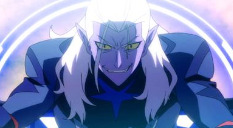
This patient is dangerous under regular circumstances. Extremely dangerous when under the full influence of quintessence. Avoid!
#Voltron#Voltron: Legendary Defender#Prince Lotor#Patient File#Diagnosis: PTSD#Diagnosis: Narcissism#Diagnosis: Psychopath#Classification: Dangerous#Classification: Extremely Dangerous
9 notes
·
View notes
Note
Ruki's possessiveness HCs? (over his s/o)
Ruki Mukami: Possessiveness over S/O Headcanons
⛓️ Every part of your body, from the chest up to the entirety of your throat, your shoulders, and even your nape adorn his bite marks, both loving and brutal. This is so that no matter what you wear, unless it's a turtleneck or scarf, all the passersby you encounter to your closest of friends and family will know Ruki lays claim to your body, blood, and most importantly, your heart. Ruki does this not only to slake his thirst or to fulfill his sadistic urges, but also because seeing you don the ultimate proof of possession instills a flame he can't seem to extinguish no matter how hard he tries. Instead, he yearns for more.
⛓️ Aside from the usual 'livestock' degradation he often resorts to, Ruki takes pleasure in calling you his. "My livestock." "My prey." "My [your name]." All of you is for him to own, claim, and mark as his personal property, and never will he miss out on the opportunity to verbally express it as well. There are times in private, such as the Mukami manor or in his bedroom, in which he will threaten you to confess who you belong to or other embarrassing lines such as "please accept my blood, Master," otherwise he will engrave more than just his fangs. After all, Vampires are known for their claws.
⛓️ Bite marks, albeit slowly, eventually fade and heal. Thus, Ruki would rarely display his ownership over you in other ways, some seemingly harmless and others taken to a whole new level of obsession and bloodshed depending on how obedient and well-behaved you've been for him. For instance, if it's a special occasion such as your birthday and you've followed all his orders, carried out all his wishes, and stay put in one place where he can monitor you more easily, then he might gift you a necklace or choker in place of a collar that one normally puts on their pet in case they run away from home and get lost. It's the same idea here. Alternatively, he won't hesitate to carve you out with his nails as well to get the same effect, one that will take much longer to heal and also spill more blood.
⛓️ Given the tragedies and suffering of his past, the eldest Mukami fears that one day you might betray him and commit the same wrongdoings as his mother. Fleeing out of fear for her well-being, abandoning the spouse she once believed would cherish her instead of hurting her. Because of this, he has developed strong distrust in others, especially women. So, don't be surprised when, even after your attempts to prove your loyalty to him, he still questions you. Occasionally he might accuse you of finding a "new master" behind his back, then punish you accordingly so that you can't even take another step without his assistance. This means draining the blood from your legs, your calves, and even your arms to immobilize you.
⛓️ In public view, what Ruki lacks in his enforcement of the Master/Livestock dynamic, he accommodates for in physical affection. Incessant hand holding, possessively wrapping his arm around your waist, and embracing you from behind are all to be expected. Indeed, it may come across as hopelessly in love to others, but only you two know the repercussions of the pain to come your way when you withdraw from his touch. Pulling away or rejecting him will undoubtedly result in more than just a harsh scolding when you arrive home after a long day of errands, school, work, etc. The dungeon, after all, has always been one of his favorite go-to sites of discipline in the whole mansion.
⛓️ Whenever the Vampire sees you with other men or anyone who looks like they harbor lecherous motives towards you, Ruki isn't afraid to show a hint of his power if it means chasing them away. He would subtly crush an object with his bare hands or punch the wall to leave a dent just to scare the poor recreants off, but it doesn't end there. No, he will be certain to discipline you as well for involving yourself with filthy whelps, saying things like "how dare you wag your tail for someone who's not your master" in the most intimidating cadence you've ever heard. Witnessing someone else get too close for comfort around you or defiling his possession with an ogle easily agitates him, so beware who and where you spend your time.
⛓️ Thanks to his watchful gaze and even the bat familiars he can summon in the blink of an eye, Ruki can and will always keep tabs on you. If you're in public together, then he'll ensure you're in his sight. As much as he can help it, the Vampire doesn't want a repeat of his human past, so needless to say, granting you an opportunity to flee is the last thing he'd ever do. For every hour of every day of the week, he already knows what you'll be doing, where you'll be located, who you're spending time with, and whether or not you'll be happier outside his presence—which would land yet another penance for you.
⛓️ In conclusion, Ruki at the very least is only affectionate with you. With everyone else, sure, he puts up an ordinary façade of charisma and charm, helping a stranger with whatever they might need as to not raise suspicion around any human peers. However, each sonorous murmur against the shell of your ear, the pain and pleasure of his fangs, and professions of love—he reserves it all for you alone. His possessiveness and tendency to get jealous only starts to lift once he realizes that he doesn't require the frequent bloodsucking, the arm enclosed around you 24/7, or the Livestock sobriquet to convince you to stay at his side, remaining as both his prey and his lover forevermore.
"Not even death shall separate us, Livestock. Forever and always, you belong to me for the rest of our days. No one can ever come between us and those who try shall perish at my hand... Now then, I'll be sure to engrave my fangs into you so you know that you're all mine."

#diabolik lovers#ruki mukami#mukami ruki#diabolik lovers headcanons#ruki mukami headcanons#mukami ruki headcanons
66 notes
·
View notes
Text
Neon Genesis Evangelion analysis chapter 22: Katsuragi Misato Part 1 The cross in her hand
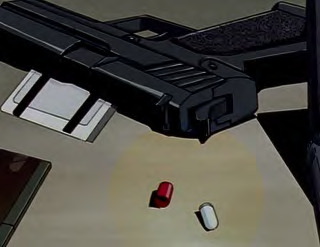
Kaji's final gift
The three characters representing the "Second impact generation" are Kaji, Masato, and Ritsuko. They are respectively entwined with Asuka, Shinji, and Rei throughout the characters' developments. Both Kaji and Misato self-reflect on their own pain and suffering while observing Shinji's growth and passes on their "Will" to Shinji. This "Will," shared by Kaji and Misato, refers to the desire to understand the "Truth" and the motivation to overcome any adversities standing in the way. Misato climbed up the ranks to become a high-ranked official of Nerv. Kaji became a spy acting for multiple agencies and organizations.
Due to having chosen the more dangerous route, Kaji lost his life much earlier than Misato. Knowing his impending death, Kaji passed on the pieces of information to his unanswered questions to Misato through 'Physical intimacy.' In this chapter and next, we shall discuss Misato as a character and as a person who Kaji trusted solely and lovingly.

"Until the very end, Service, Service."
Katsuragi Misato
29 years old
Blood type: AB
Height: 163cm
Weight: 47Kg
Three Size: 33-23-32
Considering her diet and drinking habits, it is a wonder how she manages to maintain such weight and proportions. As the Nerv operations bureau's leader, she was a Captain at the start of the series and was later promoted to a Major. From her rank insignia and the information from Evangelion development documents, we can see that she is from the "Japanese self-defense force." As a young girl, she was caught in the Second Impact, and this incident left a large scar under her right breast; she seems to associate the scar with painful memories. She is the daughter of Dr. Katsuragi, who lost his life in the same second impact while saving her life. This act of sacrifice indirectly provided the reason for Misato's eventual employment at Nerv; the need to find the "Truth" and revenge against those that caused her father's death.
She moved into the third Tokyo city shortly before Sakiel's advance against the city. She became the Ikari Shinji's guardian after the battle. To her, it could have been a fulfillment of a desire to build an ideal family life, one she never had as a child. For the same reason, she takes in Asuka and, along with Penpen, forms a happy cohabitating unit of 3 human 1 bird family.
The house that she lives in was provided for her by Nerv and is large enough for three people to live together without much contestation for space. To touch on Penpen for a moment, he is an animal mascot sketched out by Sadamoto following Anno's request for an animal character to brighten up the show's atmosphere. The concept of a "Hot spring Penguin" is fictional. He eats human foods and drinks beer. Inferring from his human-like diet and ability to view TV or read the newspaper, we can guess that he was born from a mutation or a lab experiment. The backpack he wears on his bag is theorized by some to be a miniaturized fridge to keep him cooled. Due to security reason, he is sent off to live with Hikari (Shinji and Asuka's classmate) and makes his final appearance in the "Omedeto" Scene,
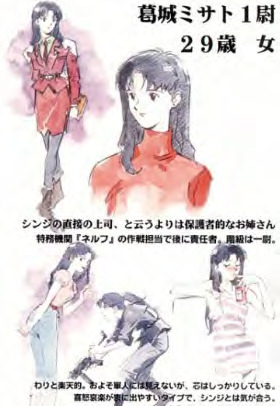
Katsuragi Misato in the development phase.
Misato is one of the rare characters whose design has not changed from the planning phase of the series, and on a side note, Anno was a big fan of the sailor moon series. Rei's name was inspired by Hino Rei (Sailor Mars). The design of Misato was based on the image Anno had of Usagi (Sailor Moon) as an adult. Adding to this point is the employment of the same voice actress (Mitsuishi Kotono) and Sadamoto designing their hairstyles to be identical. Furthermore, according to Sadamoto, Misato is a car enthusiast, and her room is full of related magazines and newsletters.
Returning to the topic, just like Shinji, Misato is a character who was designed with careful detail. According to Anno's production declaration (What is it that we are trying to make?) Similar in vain to Shinji being the child at the center of the Third impact, Misato was conceptualized to be the adult who was once at the center of the Second impact. Furthermore, both are inept at creating meaningful social bonds and are afraid of being hurt by the other. Lastly, they are both not used to communicating their needs to the people in their lives.
The difference between the two is that while Shinji feared interaction and ran away from the other, Misato made surface-level interaction with the largest number of people while hiding her true self under a mask. While Shinji's actions are understandable as he is only fourteen and made to shoulder an adult's responsibility, Misato is presented as a juxtaposition. Misato is presented as a child putting up an adult's veneer, showing her immaturity even as she is nearing her thirties. Asuka, who was acquainted with Misato during her service in Germany, described her lifestyle as 'Hypocritical.'
As we have discussed in the previous chapter, Kaji wore an irresponsible adult's mask to hide his serious side in pursuit of the Truth. In contrast, Misato wears a serious and bright adult mask to hide her cowardice and weakness. This would have worked against those that interacted with her on a surface level. However, it would have had to come off eventually, making it impossible to hide from people she lived with. This gave Shinji the perception of Misato as a 'hypocrite,' making it easy for him to reject her kindness and run away from her house.

Furthermore, when she lost Kaji and lost all willpower to put up that front, she could not care for the children physically nor care for their mental wellbeing. Concerning this, Asuka began closing herself up from Misato due to her jealousy for Kaji. Asuka also loved Kaji to the point she attempted sex appeal but was rejected for being "too young."
In episode 15, Asuka learns of Kaji's true feelings and begins feeling defeated, resulting in her bearing fangs against Misato. When her synchronization levels dipped below Shinji's in the following episode, her confidence in herself began to bottom, and Misato was in no position to offer help.
When Kaji began a more intimate relationship with Misato, whom Asuka perceived as mentally immature, Asuka was lost and began to distance her feelings from Kaji. Asuka's heart was broken, and there was no adult she could rely on. This point about Asuka will be covered more in later chapters.
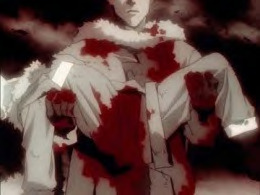
Dr. Katsuragi
Before diving deeper into the character analysis of Misato, we need to understand her father, Dr. Katsuragi, more. He was a member of the Gehrin and the first person to theorize the working of the fruit of life; the S2 engine. The 'Super Solenoid theory (S2 theory)' first theorized in 1999 attempts to explain the mysterious energy source: the 'infinite spiral energy.' This being a fictitious theory, we can not go in-depth here. Still, for the sake of explanation, it is explained as a potential source of infinite energy that Dr. Katsuragi desired to use for humanity's good. Ironically and unfortunately, it was this theory that resulted in the tragedy of the second impact.
In the year 2000, the Doctor receives Seele's funding to form the Katsuragi expedition team. He leaves for Antarctica to prove his theory and perform the 'contact experiment' with Adam. While his theory was proven to be accurate, he losses his life from the 'eventual second impact. Our dear old Keel described the Doctor demeaningly, to quote, "The type of man who was blinded by his passion and unable to see reality," this statement is accurate, according to Misato. This makes him a figure similar in character to Gendou, someone whose work always came before all else, even his family. Causing Misato's mother to always cry tears of loneliness.
Misato understood the impact her father's absence had on the household. This resulting in the pressure to be a good child to please her mother. This leads her to refute others' descriptions of him as 'Kind and sensitive,' calling him 'weak and childish'; as someone who was irresponsible to his family and ran away from responsibilities. Misato's mother eventually divorces him, and she welcomed this separation. It seems that Dr. Katsuragi was shocked by this incident; Misato described it as getting his 'just desert.'
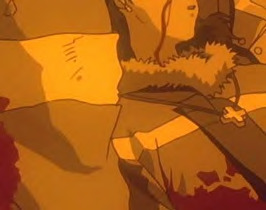
The cross: Dr Katsuragi’s memento
But of course, we have to answer one question regarding Dr. Katsuragi's affection towards his daughter; why did he bring Misato along to Antarctica in 2000? Since there is no mention of her mother in the series, we can infer that he gained custody of Misato after the divorce, thus being her only guardian. Yet to bring a young child to Antarctica was nothing more than putting her in danger. While he did not know of his impending death, bringing his daughter to such a place was downright irresponsible. While there is not enough detail about this, bringing Misato for the expedition might have been his way of showing affection. An imperfect way to express his love for her.
Here, we can draw a parallel with Ikari Yui's actions during her contact experiment. Perhaps the reason why the Doctor wanted to show Misato the contact experiment was the same as the answer Yui gave to Fuyutsuki; "To show this child the possibility for a bright future." And like the Ikaris, Katsuragis also separated in a tragedy. A tragedy for everyone involved.
Looking at the second impact scene, we can observe the Doctor covered in more injuries than Misato. This is likely due to him shielding her from harm using his own body.
With all of his remaining strength, he hoists Misato into an evacuation capsule. His face is covered in blood, and tears roll down his cheeks as he put his cross necklace around her neck. He draws his last breath. This necklace symbolizes the Doctor's love. The love for his family. And the love for humanity. He instills it in the cross and passes on all that he held dear to Misato. She now has to protect herself. But with the cross, the Doctor's desire to protect humanity also gets passed onto her. A burden too big for a little girl to bear.
Even though she claims to dislike her father, Misato is to be confused about what to feel about him; he risked his life to protect her after all. The biggest reason she is at Nerv and fighting the angels is likely to remember him and continue his legacy. Thus, the necklace is a protection charm and emotional support for Misato. We can see this when she desperately grasps the cross as Zeruel is about to shoot its laser.
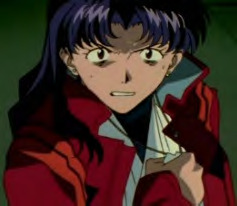
The cross in her hand
To Misato, the reason for her battle against the angels has less to do with the desire to protect humanity. She fights, as Ritsuko points out in episode 12, as a form of revenge. She admits to this fact in episode 15 during her conversation with Kaji. This is the reason why she takes on near-improbable strategies based on her 'gut feelings.' Especially in episode 12's battle against Sahaquel, the likelihood of success was 0.00001%. The subtitle for this episode is 'Don't make others suffer for your personal hatred.' This perhaps was something Ritsuko (or even Misato herself) was thinking deep down.
Yet to chalk all of this up to a simple desire for revenge is reductionistic at best. The cross in her hand was concurrently the unfulfilled love Dr. Katsuragi had for his family and also the hope for a brighter future for mankind. It was also a Cross, the symbol of the weight of responsibility, and it was what she stood for.

Various iconographies of crosses in Evangelion

The beginning of the universe?
Touching on the cross as we conclude this chapter, we are bombarded with its iconographies across the series. The most notable being the flash of light produced when the angels die. Seeing that this is observable during the third impact, it perhaps symbolizes the soul exiting the body. Another memorable cross is the one we see flashing during the opening sequence.
In the production commentary, the blue dot at the very start of the opening, which expends out in a circle and into a "red gas," is revealed to represent the big bang and the start of the universe. This is followed by the crosses that make up the transition into the title screen, the same kind of visual directions used for the in-episode eye-catch.
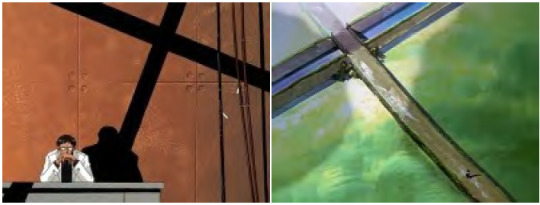
Beyond the surface-level representations listed, there are many more hidden references to this iconography. In episode 21, after Yui's absorption into Unit – 01's core, Gendou's shadow carries a gigantic cross. The object casting this shadow is not shown as it is only a symbolic representation. It represents the responsibility that he will carry, One that Yui used to carry and Gendou perverts. The responsibility to forgive humankind's original sin. In episode 4, when Shinji runs away from NERV, he walks down a long path shaped like a cross. This symbolizes the heavy responsibility that he is Fated to carry. That he is destined to be burdened with.
As Anno has put it, Evangelion is like a puzzle to be pieced together. There are many more such scenes, but I will leave it as it is for your enjoyment of discovery.
TBC Chapter 23 Katsuragi Misato Part 2 Dear Shinji, this is my Truth.
#Neon genesis evangelion#Evangelion#Eva#End of Evangelion#Nge#Nagisa Kaworu#Lilith#Sci-fi#Ikari Shinji#Soryu Asuka Langley#Asuka#Ayanami Rei#rei#Anno Hideaki#Katsuragi Misato#Kaji Ryoji#Anime#Analysis#Review
122 notes
·
View notes
Text
My Views on Some of the Cast of the DSMP
We got a lot of things flying left, right, and center right now about characters in the dream smp fandom and I love it. I love seeing the perspectives and the stances and everyone's opinions as long as we're all being civil about it. So, I'm civilly putting in my two cents about... Well... Everything. But mainly just Ghostbur, Phil, and Techno since this post would get obscenely long if I did everyone.
I'd like to just say one thing about my approach to this story:
The characters are morally ambiguous. No one is the good guy. No one is the bad guy. No one is an exception.
Yes, even Dream falls under this.
These are all people, and I always hesitate to call people bad or good in real life because there is so much more beyond what I can see of them, and I think it's a testament to the wonderful acting, improv, writing, and character establishment/writing that it can get me to see fictional block men who do things like claim their mother is a salmon and fill their palaces with flamingos as people.
With that information, I say that I love every character for who they are in the context of the narrative and how they play their role in said narrative.
And I love how each and every one of them are in the wrong somehow in some way.
Ghostbur is suffering the loss of everything he built, technically, a fourth time over.
First with Dream's initial explosion of L'Manburg, second with the actual explosion of L'Manburg, third with the explosion of Logstedshire, and finally with the final explosion of L'Manburg. He's hurting and yes, we all feel immensely bad for this little amnesiac ghost boy who only ever wrote books and built what he loved.
But he acknowledges that he's also hurt people. He knows that. That's why he wants to be resurrected. Even if he forgets conversations, impressions and residual feelings and ideas still hold over, since he clearly didn't just forget about his desire to be resurrected after he forgot his spat with Phil. He recontextualizes his desires and feelings under new sources but the idea of, this is the only way I can make everyone feel better, still lingers. Fundy told him that he needed to stop running away from his problems and face them. He may have forgotten that conversation, but the idea that who he is and what Ghostbur, as an entity, represents is hurting everyone, lingers.
Ghostbur has hurt people. Not of malicious intent, but intent does not dictate the feelings and actions of those around you in response to your own actions. Ghostbur uses his blue to forget his sorrows, and that action cuts those around him off from the emotional reconciliation Ghostbur knows they need from him.
Even then, who he is is not primed to deal with the fallout that would come if he even had voluntary control over his amnesia. Ghostbur insists he's not Alivebur, but he kinda is in a way. Both are very rigid in their beliefs when their mind is made up. There is no negotiation afterwards. Ghostbur's fundamental ideals have been locked in from the start of his existence. He makes others happy, and he restores L'Manburg. The idea that he no longer has the capability to do either of these things as he is now lingers without context. A ghost of a conversation forgotten that got held onto as the only good thing to come out of it.
Ghostbur is not 100% good. He's airheaded and well meaning, but he's never addressed the core issues that he caused.
Phil is trying to prevent what happened to his son from ever happening again.
Phil is a bigger picture man. He sees the world around him as a collective that works together to maintain itself. He doesn't have many personal ties beyond Techno and Wilbur in canon. He truly acts like a third-party hanging above the fray watching as the tides of war ebb and flow. He sees the corruption and sickness that lies within L'Manburg that killed his son thrive long after the mad king had been struck down. He held hope that in the wake of tragedy, Tubbo and the citizens would turn the tides, but they proved him wrong. What killed his son tried to kill his friend, and Phil was going to stop it.
But Phil was too zoomed out to see the personal aspect that L'Manburg held. He was too focused of the bigger picture to remember that Friend was in his house. He couldn't see L'Manburg as the home of many. He was still too detached from the feelings of the people to understand why Ghostbur was upset in the first place. The conversation between the two was not about Phil trying to get Ghostbur to understand why L'Manburg needed to go, it was Ghostbur trying to get Phil to understand why this was not the right option.
Philza has hurt people. He hurt his son by not only aiding in the destruction of his son's home and Friend, but also refusing to see the individuals in the conflict. He hurt Fundy by rejecting him the moment he realized that his grandson was following the tide of battle in the wrong direction. In the end, Phil never chose to see the situation from any other perspective other than his own.
He's disjointed and disconnected from the world around him. He truly loves and cares for two, at one point three, people on the server canonically and beyond that is an ambiguous blur. This isn't really his battle, in all honesty. He came when he saw that Wil was gonna do something everyone would regret, and he tried to step in and stop it, but beyond that, he was never there for anything. He never cared about L'Manburg and he never cared about its people. He's kind and caring to those in passing and he has a sense of nobility and honor where he respects and helps those who helped him. Still, he sees the world around him as a collective, and rarely anything more.
Philza is not 100% good, but he's not 100% bad. He's principled and intelligent, but he has no concept of how his actions affect the individual beyond the collective.
Techno has been abandoned and played like a fiddle this whole time.
Technoblade is, beyond a shadow of a doubt, the most straightforward character in the smp in terms of motivation. He is explicit and blatant about his anarchy and goals. Yet, somehow, everyone keeps falling into the thought that Techno is a naturally passive force that can be activated into action. In actuality, Techno is very proactive. He prepares and plans beyond wartime. He acts swiftly and precisely. He follows Sun Tzu's tenants faithfully. He does not idle and sticks to his most recent plan to a T if he thinks he can win.
But Techno doesn't see outside himself. He knows what works for him but is blind to others' needs and desires. Anarchy is how Techno can live comfortably, but not everyone can and certainly not everyone in the server. He plays by his rules and rational and imposes those thoughts onto others, not understanding when they act contrary to his understanding and thus rules them to being irrational on purpose. That they just want to ruin his life.
Techno has hurt people and we all know this. Everyone here believes that Techno betrayed them not when he wouldn't join their government, but when he wouldn't leave well enough alone. He did that too late. If he had conceded at the end of the Manburg-Pogtopia war that he did what he was called to do and just left for retirement in the first place, he could've lived just fine. But he's proactive, and he felt betrayed by them when they instantly instilled not only a new leader, but one under the same format and structure that had already failed twice. But who ever said that was his problem?
Techno, as well as everyone but especially Techno, sees himself as the one in the right all the time. He doesn't regret a single thing he's done, at least not anywhere I've seen. He is sure in his beliefs, lifestyle, principles, and logic. He enforces these on other's and sees them as ignorant and dumb for thinking different to him. It takes a lot for him to let bygones be bygones, and it's easy to provoke him into action. Albeit, none of this is helped by the literal chorus of voices constantly memeing in his head, but my point still stands.
Technoblade is not 100% bad, nor is he 100% good. He's motivated and honest, but he doesn't think about other's preferences having the possibility of having a logic behind them.
I could go on and on with nearly every main player in this story but this is what I have off the top of my head.
Basically: no one is good. No one is bad. They all make mistakes as a result of their flaws and those mistakes negatively affect real people in real ways. And I wouldn't have them act any other way.
Your favorite doesn't need to be a saint. You don't have to bend over backwards to defend your fave in order to make them the morally correct person in any given situation. Let yourself love a rich, flawed character. Because they deserve to be loved for their flaws and all.
They deserve to be loved as people.
#ghostbur#technoblade#philza#ph1lza#wilbur soot#philza minecraft#dream smp#dsmp#dsmp wilbur#dsmp philza#dsmp techno#dream smp writing#character analysis#dream smp analysis#dream smp doomsday#dream smp spoilers
37 notes
·
View notes
Photo


In the beginning was RAPHAEL, an ANGEL loyal to the cause of the ANGELS. He is said to be IMMORTAL and uses HE/HIM pronouns. In this New Testament he serves as a MEMBER of the VIRTUES. Blessed be his name.
THE INDELIBLE MARK.
They say that he is intoxicating to be around -- enthralling in the way that he approaches all things, his mere presence instilling in those who are enraptured by it something akin to an almost demented sense of beatific awe. When he was anointed the Virtue of Fortitude, though, it seemed that something more was allotted to him; his healing abilities were amplified to the point where he is able to discern what ails a person, whether it be mentally, physically, or emotionally. If he is wrathful, it is said to be amplified ten-fold and those who have borne witness to the unfortunate occurrences often find it too difficult to recount; since that is the case, they seem to miss the curl at the edge of his lips that whispers of something unsettling. However, if he is in a benevolent mood he is said to be able to take the burdens of the pain away -- being bestowed with his presence becomes a reprieve. This innate ability, paired with his gifts for healing, are why he is largely popular with the mortals of the Holy Land. For this brief period of time, at least.
THE HISTORY.
There was something beautiful to be found within suffering -- the way the tip of the nose flushes red, the way that tears clung to lashes like fresh morning dew, the way that the heart seemed to stutter and skip in tandem with the great heaving breaths that were taken when air seemed to forsake their lungs. As Raphael looked on from his lofty view, he couldn’t help but think of the beauty that there was to be found within suffering. Of course, he knew nothing of it; only the hypotheticals, the chemical reactions it evoked within the brain, how some of it was physical, other such variations were emotional and still others were of the mental variety. God had placed His hand upon His son’s shoulder, the two of them watching on in their gilded kingdom -- enraptured by the agony that the mortals placed on themselves. Raphael never thought to question why God, in all His goodness, would allow such things, no, he was far more fascinated by the lengths they would go in order to avoid it -- or inflict it, if they felt so inclined. What a sweet sigh issued forth from him as he thought of the a million and one ways in which he could aid them in the avoidance, and a million more to make them suffer all the more. He wondered if their tears were as decadent as they seemed, if their cheeks were warmed to the touch when slick with tears. Alas, all he could do was look on and wonder.
What excitement charged through his ichor-laden veins once God allowed him to step foot upon the earth -- how eager he was for the cacophony of agony and suffering to ring in his ears, a more beautiful hymn than that which the choir of angels sung. He looked upon the mortal faces, eager to see unfold the great suffering and tragedy that seemed to cling to them closer than their own shoulders; what a disappointment it was to see something far more tedious paint across their faces. The terror at bearing witness to a celestial soul, the beatific awe that would appear on their faces once they realized that from a creature such as he, there was only the salvation of God to follow. It seemed like something of a cruel joke when any notion of suffering was wiped away as soon as he intoned the words of God and placed his hands upon their frail, fleshy frames. Still, though, he held onto the hope that God would demand of him something more stirring than the healings that he was so frequently told to perform. There were those among the heavenly ranks that were harbingers of death, that made for themselves infamy and curried among the mortals terror and fear; they were the cause of the salted tears that fell upon their cheeks, of the moaning, wailing, and grinding of teeth that were so lauded about. What did he offer but farcical acts that were meant to be displays of God’s favor and love? What did he offer but anecdotes of whimsical performances that only served to gild the name of a self-important God?
The centuries began to bleed into one another, an endless torrent of mediocrity and boredom where nothing of import was required of him except to laud the ways of a creator that was far less intriguing than He painted Himself to be. And still, he watched from his lofty place in the gilded kingdom as they murdered one another, as they rent themselves apart in determination to place themselves upon a throne that was far above their reach. It was then that he began to wonder if he might stir his brothers in much the same manner, if they might be fallible enough to do as the mortals as wont to do; if they might tear themselves apart in the hopes of some inane idea of power, righteousness, and glory. They were none the wiser as he placed a few carefully chosen words in their ear, weaving the idea of revolt into their conversations as a snake might weave through the grass -- slickly, subtly. The flames of his brothers’ anger were easy to flame, the embers long ago planted by their Father’s pride and self-important glory they were all forced to bend a knee to. He all but placed the sword in Michael’s hand, all but ripped his Father from the throne himself. What a satisfying thing it was to have God look him in the eyes and know that He had incurred His own ruin. That ruin just so happened to also be called Raphael.
When the world remade itself into something far greater -- far more chaotic, far more vicious -- he could not help but pause to admire his own handiwork; the sun rose and set in the manner that it did because of him, the earth was painted awash in its vibrant away of colors because of him, and the mortals that now fancied themselves as something powerful were only considered gifted because of him and the mechanisms of his enigmatic mind. But he finds that, with the peace that the world sits on the brink of, there is the threat of mundanity lording over him once more. There will still be the tragedy and suffering that he so loves, but it will not be at the scale that it once was. The mortals will no longer be sharpening their knives to claw at the angels, the demons will no longer goad the mortals. There will soon be no bloodshed, no wails of sorrow and cries of agony for him to listen for -- no, there would only be the gentle sigh of a world at rest and the soft laughter of euphoria pouring in through his window. The thought of falling into the mind-numbing harmony that they so long for is a tragedy that he isn’t interested in. It has been quite some time since he has bothered to dip his hands in blood, whether it be celestial or mortal, but he takes no issue in the thought of it. There was something beautiful, after all, about suffering -- and incredibly intoxicating about knowing that he is the one who inflicts it.
THE CONNECTIONS.
MICHAEL & GABRIEL: The Archangels. They were known as the three Archangels in the old world - famed and venerated. A soldier, a messenger, and a healer. They are brothers in every sense of the word: bickering over the smallest of things, needling one another, but loving one another all the same. Though, as of late, Raphael has noted a rift between them, the root of it lies within their differing loyalties -- though Raphael has always made a note to keep his opinions rather close to the chest, instead belaying any need for honesty by offering his considerations of both sides of whatever arguments may occur. Although, in truth, chasm is a more accurate word to describe it than rift. Before, their arguments would end in jest, but now Raphael has observed that each one seems to drive Michael and Gabriel further and further apart. He does not much mind the fact that they seem to be set upon their differing path -- what intrigues him is how the two others might fracture and decimate themselves from within without one another. Perhaps he is curious to see just how volatile their age-old friendship is, what it might take to weave them together and drive them into unforgivable furies. In truth, there is no end to the immeasurable excitement that he thinks this new age might bring.
ROMILDA ALTIER: Galatea. From her, he is determined to carve the most intricate corruption so that others might behold its beauty. She came to him of her own free will, chin held high, eyes blazing with poorly disguised contempt for him and his celestial nature. But still, she was determined to make something of the Gift that she had been given, was determined to render the powers that were comparable to that of a lioness into something more gentle in nature -- coaxing it into the nature of a lamb. He would indulge her, of course, would let her think that angelic nature was something much more serene in its nature. But beneath the serene waters is something far more terrifying than even could conjure in her nightmares. Slowly -- carefully -- he seeks to see how that light within her might scorch the earth, might raze what creation has wrought. From her, he will bring forth the beauty that stirs within one a primordial fear, from her he will bring forth machinations that the likes of the long-dead God could never have hoped to bear witness to.
ABADDON: Blight. It is very rare that he leaves himself unguarded -- but it is just so utterly captivating, witnessing utter helplessness. He had seen it once, a particularly wiry little angel had left his flank open and what was Raphael to do with the opportunity but teach him a lesson he might never forget? And so he had done as any seeking to reinforce the strength of another might do and allowed himself to fall into a frenzy that the poor welp might never forget. In doing so, though, he had left himself exposed to the rather underhanded tactics of Abaddon, brutally stealing from him the opportune moment for tutelage. And, as a result, ensured that the other angel would be softened after being aided in such a manner. It seems that every time they encounter one another, a satisfied little smirk besets her face -- how much longer she’ll be able to wear it, he can’t say. Patience is a particularly potent virtue that he has learned to cultivate and refine until it ends up cutting others like a blade. One day soon, he will be able to hold it against her throat like a knife and watch as she bleeds from how deeply he will inflict it.
SAMAEL: Parasite. The two of them had been created to contrast one another -- one to highlight God’s benevolence, the other to inflict his wrath when the Creator saw fit. They had been irrevocably tied since their very inception, and had been intended to serve as a means of balancing the tenets of the universe. The two were knotted together, tied by a string of fate that Raphael had tantamount to the shackles that had tethered the monsters within Tartarus. He had the pleasure of watching him fall, watching the great Samael who wielded his power about so blatantly and readily that it oozed from him like fumes from a rotten bog, staining all who dared to draw near to his putrid presence. It has been an eon and a half since then, since he has had the pleasure of watching the cursed creature fall, but still the satisfaction he takes in holding the other’s gaze has not abated. He has borne witness to the undoing of Samael once before -- he will allow the demon to crawl ever-higher, just so he might have the singular joy of being there when he is wrenched from his place of power once again. If he is lucky, this time he might set in motion the condemned creature’s fall himself.
Raphael is portrayed by Ricky Whittle and was written by ROSEY. He is currently OPEN.
16 notes
·
View notes
Text
in the blood: connecting the backstories
With the arc concluded and what I imagine is pt 1, the pre-AFO bits, of Tomura’s backstory revealed, I thought I’d finally sum up one of the major points of this plot. Scattered throughout the arc were three major backstories—Himiko, Twice, Tomura—that could use some piecing together. It doesn’t seem like they were chosen at random or were primarily subordinated to good timing, and instead were written because they parallel and reinforce certain themes in Tenko’s past.
Here’s my typical disclaimer that these connections may not have been intentional at all, but, y’know. We’ll pretend Horikoshi is a competent writer and etc. etc. Of course, there’s also the question of what conclusion all these narrative threads points us towards, and I’m chronically afraid of making a wrong prediction so I won’t do that on this post lols (it’s also not 100% clear, which I’ll address). Nevertheless, I think it adds significance to consider Tomura’s past with the addition of framing it through the other two backstories, considering what they say about Quirks, society, and the characters’ internal processes about where they fit in the overall scheme of things.
(note: some screenshots below the cut contain mild gore!)
I. Quirk repression
We encounter this for the first time in the MLA arc through Himiko. Although we’re not privy to Himiko’s thoughts during the flashback, Curious makes an assertion that Redestro later repeats: that Quirks can, to some degree, influence a person’s disposition. Transform elicited in Himiko a desire to drink blood (in order to develop a bond of closeness), which was largely viewed as deviant, and she was pressured to suppress not only her impulse, but her Quirk as well. This idea of Quirk=disposition is also repeated with Tomura, who Redestro asserts is only capable of destruction.

Without being told Himiko’s perspective in the flashbacks, we don’t know how her experience with suppressing her desires went, nor whether she experienced any adverse physical effects from doing so. Tomura, however, is clearly stated (by AFO, so it’s worth taking with a grain of salt) to experience unbearable itchiness whenever he represses his urge to destroy, a sensation which only seems to abate when he uses Decay. So for the moment, the message seems quite clear: suppressing one’s Quirk is akin to suppressing one’s self, and even more drastically, there may be physical consequences to doing so.

On the flip side of Quirk repression, then, there’s Quirk liberation. That’s what the Metahuman Liberation Army is going for, of course, but the three characters discussed here also found relief through their Quirks: Himiko in finally shattering her mask, Twice creating his crime gang, and Tenko eliminating that which he hated. Embracing their Quirks is portrayed as a way in which they achieved not only emotional pleasure and fulfillment, but agency as well—an increase in control over their own lives and fates—finally allowing themselves to do what they were “meant” to. This is, supposedly, a move which empowers oneself.
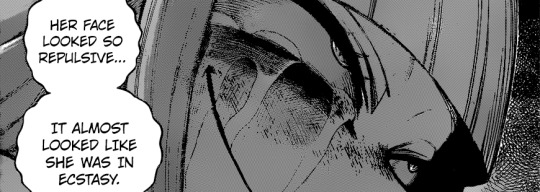


II. Quirk trauma
But that’s not entirely true.
Just as Quirks can be liberating, they're shown to be harmful when used without restraint, turning against their wielder and instilling suffering. Twice’s clones eventually went out of control and began to fight each other for claim to the original, and Tenko’s Quirk awakening killed his entire family. Both experienced trauma involving the people closest to them, Twice being confronted with “his own” betrayal, while Tenko witnessed the deaths of his family at his own hands—in the aftermath, they’re both left completely and utterly alone, abandoned by those they believed they could rely on, with uncertain recollection about how events actually transpired.
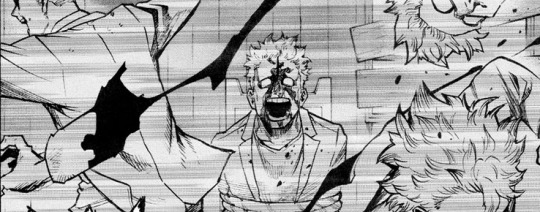
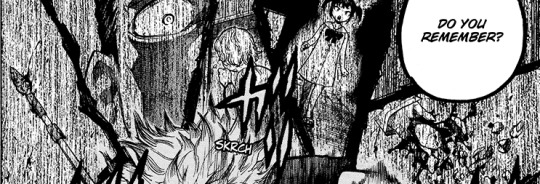
Then it’s no coincidence either that Twice’s and Tomura’s chapters focus on arriving at the truth of their traumas. Twice, after having spent an indeterminate length of time trapped in the uncertainty of his own realness, is forced into confronting his fear of disappearing after Skeptic orders his arms broken; in surviving this, he’s able to confirm that he’s the original Twice, once and for all. Tomura is likewise pushed into recalling his repressed memories (let’s assume right now that they’re the real memories) as his last connections to his family—their hands—are destroyed one by one.

It’s through the discovery of this truth after being confronted with their greatest fears or insecurities that they’re able to embrace the full strength of their Quirks, returning to a default, ‘pre-trauma’ state. Twice is able to create doubles of himself once more, and Tomura becomes able to unleash a stronger version of Decay. While Himiko’s case is much less drastic, the new characteristic of Transform also seems to be linked to her reaffirmation of her ‘truth’ as well. Those ‘truths’ may sound positive or negative, motivated most obviously by self-preservation in Himiko’s case, self-actualization(?) in Tomura’s case, or protective instinct in Twice’s.

Personally, I place a lot of (if not most) importance on Twice’s motivation in this arc, because his past and desires most strongly encapsulate the themes we see repeated across all of these backstories:
III. Alienation and belonging
Perhaps the strongest thread that pervades these three stories (and Spinner’s too, which we have less to go on at the moment) is the feeling of alienation. The four of them found themselves constantly rejected by those around them: Spinner due to prejudice, Twice never getting support nor sympathy after being orphaned, and Himiko and Tenko in particular being denied by their own families, both of them compelled to stifle their own desires, whether it be to pursue her instincts or to voice his dreams. They were positioned as outsiders, set apart from everyone else.



That’s why I believe it’s significant that one of the primary purposes of this arc seems to be to bring the LOV more closely together, from Spinner’s questioning and renewed loyalty, to a central conflict of this arc plot being a rescue (among other schemes from the MLA, of course), to giving the LOV a way out of the aimlessness from the beginning of the arc. Of course, past alienation and present cohesiveness also contrast each other as narrative foils, and this is most clearly exemplified in Twice’s chapters because he’s babey, which more extensively linger on his feelings towards his current situation and friends, who he sees as a remedy to the loneliness of his past.
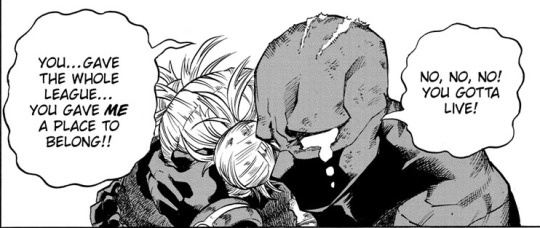
The other characters haven’t offered the same reflection towards the LOV, but it’s not a stretch to say that the group provides them with something that wider society could not. People who accept Himiko’s “normal,” who enable her to pursue her love (for good or ill); who take Spinner seriously despite being a mutant with a “useless” Quirk; and to some degree, even Tomura seems to have achieved what he once wanted. Tenko was a child who made friends with lonely kids, who wanted to be a hero, presumably to save others, but was rejected by his family at every turn and had no one save him at a time when he needed it most. And even though his life as Shimura Tenko is long gone, Tomura currently finds himself as the leader of a group of outcasts who are looking out for him, fighting through a small army to save one of their own. The irony is poetic.

IV. Tragedy or Agency?
Which begs the question: what do we do with this information and how do we interpret these characters? Are they just cruel and unrepentant villains, or should we sympathize with them as people rejected by a prejudiced society? Really, this arc offers room for both readings.
At one end, we have Himiko and Tomura, who view their decisions to become ‘villains’ as liberatory. Whether or not certain painful events in their lives affected their choices seems to matter very little to them, or perhaps those events were even a blessing for leading to the choices they made. They decided to embrace their natures even if those traits were violent, distrusted, and societally shunned, and they do not consider this eventuality as particularly unfortunate. Himiko rejects Curious’ interpretation of her life as pitiable, and Tomura likewise asserts to himself that he’s untroubled by the deaths of his family. They both represent their pasts as not a tragedy.


On the other hand, we have Twice, whose backstory chapter bears the maxim that also appears on the cover page of vol 24, and thus has the privilege of setting the tone for a major portion of this arc: “All it takes is one bad day.” Twice’s backstory (ironically enough) reads uniquely more self-aware than the others’, both about his own decisions, and about the conditions surrounding him (i.e. how other people’s decisions affected him). He was aware of the way others viewed him and how that caused his alienation—best exemplified by how disposable he was at his workplace—and of his reasons for pursuing a “solution” that only dug a deeper hole.

Thus, we have the “one bad day” part of the narrative. Twice, who was orphaned early on and isolated from his peers, got into a motorcycle accident with one of his firm’s clients. His boss hits him and fires him, leaving Twice aimless until he comes up with the idea to Double himself. Twice’s backstory interprets "one bad day” as a truism about instability, particularly in a society which appears to have few safety nets and a lot of prejudice—essentially, the chapter posits that one incident of bad luck can put someone on a worse path, especially when people act in their own interest instead of in sympathy or aid. Okay. See where this is going?

We’re presented with two narratives here: that ‘bad paths’ are either predetermined by an individual’s disposition and are liberating to embrace, or they are often the result of an individual’s circumstances and influenced by other people. Nature versus nurture. The arc does not definitively come down on either side, so I’ll stick to observations and limit on drawing conclusions.

Tenko’s backstory also fixates on a day. The turning point in his life was the day his parents’ rejection of his aspirations culminated in physical violence from his father, setting off the chain of events that led to Decay’s awakening and killing his family; in the aftermath, he was also further alienated in a busy city where no one stopped to help him until he was conveniently ‘found’ by AFO. The “one bad day” lies in the fact that Tenko was entirely salvageable; neither his hatred nor his fractured relationship with his family were conclusive in a five year old’s state of mind, and they both could have been remedied if they had the chance.

So that leaves us with two different takeaways. Can Tenko be thought of as having taken a turn for a better, more self-actualized existence—a not-tragedy—or was it indeed a set of circumstances that should rightfully be considered unfortunate because it was fixable? The resolution of this arc seems to come down pretty firmly on the side of the first interpretation: by embracing his destructive ‘nature,’ Tomura has awakened the full scope of Decay’s power, subdued the Meta Liberation Army, and gained their resources—he’s more influential than ever before, and he’s put himself at an advantageous position to take down hero society. So, clearly his internal monologue must be self-aware, because the narrative is rewarding him for embracing his purpose.
V. The League of Villains and Self-Destruction
But I do have a caveat to add, and it has to do with self-destruction. I’ve talked about Tomura and self-destruction, but that’s not really just a tendency limited to him. It proliferates in most (if not all?) of the LOV members, in more or less obvious ways. Spinner’s crisis of self-worth and subsequent seclusion was arguably self-destructive, as is Mr. Compress’ tendencies to run away from conflict. These are more metaphorical and without much elaboration yet. On the other hand, for a more literal take, there is Dabi, who burns himself alive whenever he uses his Quirk.
Himiko’s is somewhat a mix of both figurative and literal. Transform lets her take on someone else’s appearance, and she has an obsession with ‘becoming’ her objects of affection; it follows that if taken to the extreme and if she’s successful in 'becoming,’ she erases her own identity in the process. It’s no different than the ‘mask’ she assumed until middle school; she trades one mask for another, more appealing one, and her own ‘self’ is what gets destroyed.
Then there’s Twice. Double first started off as something that gave him comfort when he found himself utterly alone, but from there only lead to even more mistakes. Using his doubles to commit crimes as an ‘easy out,’ every decision Twice made thereafter piled on to conclude in his doubles’ murderfest. What began as comfort became the conduit for his own, literal, self-destruction as his doubles turned on each other.
Similarly, by the end of 239, Tomura has fully unleashed Decay. Like the first time he used it, he found it liberating, a release for all the emotions he experienced and repressed. Much like the rest who embraced their Quirks, it was a source of pleasure and comfort, but not without consequences: as shown by the damage one to his right arm, his body can’t sustain that kind of use. Decay too much, and there will be blowback in the form of starting to injure himself. It is, again, a form of literal self-destruction.
VI. To conclude:
The arc ends on a firm note about Tomura’s growth, and the direction thereof, concluding that Quirks affect innate drives which our antagonists have accepted and been rewarded for; however it follows on the heels of contradicting points about how that very acceptance and overindulgence ends in self-destruction. Our antagonists have been strongly linked together via backstory, highlighting the similar sources of conflict they’ve experienced. Familial strife, instinctive drives, the price of overindulgence, and the indifference of society are all elements that deeply influenced these characters, and their stories are continuations of how they conceptualize these elements with respect to their own senses of self. Again, assuming that we’re dealing with a competent writer, we can assume that these themes will be revisited as the story continues; namely, addressing to what degree a Quirk determines a person’s future (ideally, there should be a convergence of the messages brought up in this arc with those brought up with Shinsou and Monoma), coming to a resolution about the disputes of personal versus societal responsibility, and deciding how the narrative itself feels and wishes to convey about our antagonists and their struggles.
#shigaraki tomura#bubaigawara jin#toga himiko#shimura tenko#tomura shigaraki#jin bubaigawara#himiko toga#bnha meta#for those who want to know what to expect#2.4k words and 6 parts lulz...
111 notes
·
View notes
Text
Touka and Kuzen - contrasting managerial styles

TG 143
I wanted to take a look at Touka and Kuzen through the lens of how they handled situations differently, and how they handled their creations of cafes for their loved ones. It’s well known that Touka’s creation of ;re paralleled Kuzen’s creation of Anteiku. However, Ishida goes out of his way to show the immense differences between these two characters. This difference, and how it came to be, is portrayed in their backstories, and how they carry themselves in the actual story. This post will cover things in both TG and TG;re.
So, to start with, we’ll cover Touka’s backstory. Then, we’ll cover Kuzen’s backstory. Then, we’ll note the difference between these two characters, how it shows in their backstories, how it shows in their characters, so on and so forth.

TG;re 71
Touka’s first encounter with tragedy is at a very young age. Her mother and father are engaged by Arima. While her mother holds them off, her father escapes with her and her brother. The loss of her mother leads her father to engage in ghoul cannibalism and developing a kakuja. Eventually, he ends up running into multiple ghoul investigators lead by Shinohara and Kureo Mado and is captured by them.
There are two versions of the stoy here - according to Yomo in TG;re 71, Arata was targeted for his power. Touka’s story in TG;re 120 is that her father was killing ghoul investigators; there, we learn she laments her father’s decisions, and blames herself for his actions.
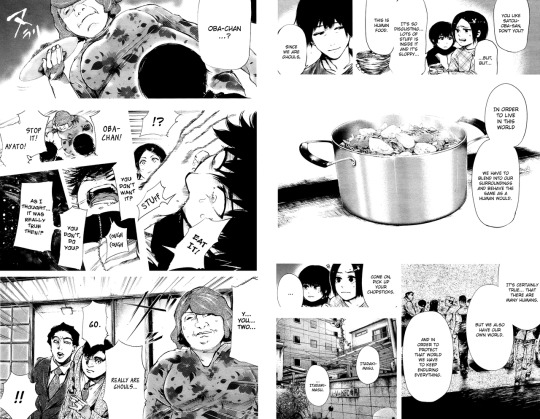
TG 71, 70
Touka and Ayato end up being turned into the CCG by the very human neighbors their father encouraged them to trust, respect, and make sacrifices for. Touka is forced to kill one of the CCG agents that attempts to capture them as a result, and they flee.

TG 71, 70
Of course, before he left, her father instilled lessons on Ayato and her. These aren’t the only ones, of course but they are the ones we’ll be discussing. Before leaving, Arata instructs Ayato that he must keep his sister safe. For Touka, he instructs her that she must teach him about life. These are things that parents often say to their children, but it ends up taking on a different meaning for Touka and Ayato due to their childhood. Because of their circumstances, Touka ends up shouldering these burdens herself, quite literally, in the form of Ayato.
Now, lets talk Kuzen.

TG 119
Kuzen grew up completely alone. He never had anyone but himself to rely on - as a result, he ended up killing countless humans and ghouls. He started cannibalizing at a young age not for the reason that many other characters do - loss of others and the desire for strength - but instead because he wanted to live a long life and not go hungry (this is reminiscent of Roma’s backstory TG;re 135). Because of his strength and willingness to kill, he comes into contact with V. V provides him with food, shelter, and clothes, and in exchange, he continues what he’s already doing - killing. Kuzen’s needs in regards to safety, food shelter, and clothing are met. However, he feels unfulfilled.
The hierarchy of needs is not necessarily linear, but, generally speaking, it goes like this: human beings have physiological needs (eg food, water, shelter), safety needs (eg not fearing death), esteem needs (eg a career), social needs (eg love and family), and finally this leads to self actualization (eg fulfillment of one’s potential). Kuzen’s physiological, safety, and esteem needs are all being met by his employment by V. However, he still lacks loving and belonging. He still isn’t reaching his potential.
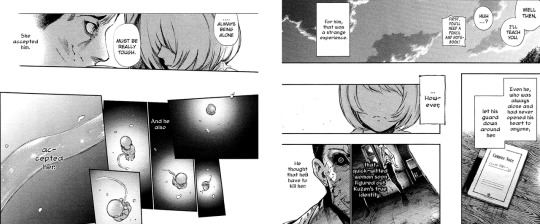
TG 119
And in comes Ukina, serving Kuzen coffee. Ukina was, according to Kuzen, an undercover journalist. The topic of her current story was V, the organization Kuzen worked for. Kuzen believes that Ukina was unaware of his status, as he was of hers, and that they happened upon one another. Eto provides a different version of the story - Ukina approaches her father because she’s aware he’s a member of V (TG;re 64).
Ukina is the first person Kuzen ever connects with intimately. She teaches him how to read the complex kanji he cannot understand. Through Ukina, Kuzen finds a place of belonging and higher fulfillment. Kuzen gets close to Ukina; she accepts him even after she finds out he’s a ghoul. Kuzen spares Ukina, and they eventually have a child together.

TG 119
Eventually Ukina’s objective is found out. Of course, V cannot let that stand. V orders Kuzen to kill Ukina. He does so, with Ukina’s last words being her remarks about his loneliness. One thing I want to note here is that, contrary to popular belief, Kuzen didn’t leave V. He simply stopped being part of their secret police. He just flat out says this, in much more polite words. That’s what “unable to cut ties” means. That’s why every time he goes to “work”, he’s wearing a V uniform. It’s why Kaiko can just walk right up to him later on in Tokyo Ghoul. There’s a reason why Eto was left in the 24th ward, after all.
This isn’t to say Kuzen didn’t make his own moves against V (such as sheltering Rize from their view), but that doesn’t mean he wasn’t a member still. All of the members of V are shown making moves against other members of V - eg, Kaiko, introduced as the face of V, helps Furuta kill the Washuus who are supposed to be higher ranking members of V. Arima and Furuta are both members of V and make their own moves against it. Matsuri also immediately considers members of V to likely be the culprit behind the attempt on his life. V in general is a very Darwinian organization that seems to compartmentalize and encourage, unintentionally or not, competition among its members as is common with authoritarian organizations.
Now that we’ve established these backstories before they began interacting in universe, lets take a look at how these two characters interact, and how they play off one another.

TG 71
There are substantial takeaways from these backstories, and what these characters actually value at heart. Kuzen’s story is a story of loneliness preceding tragedy - Touka’s story is a story of loneliness succeeding tragedy. Kuzen was always alone, but surviving. That is his state of being. It is what he knows. Touka’s situation was always with a family - making sacrifices to protect family, to survive with family. While both Kuzen and Touka ended up alone for a time, their actions and reactions are different.
It’s best encapsulated by Kuzen’s words to Touka after he hears of her and Ayato getting into a fight Tsukiyama, and splitting up once again. Kuzen’s words to Touka here aren’t exactly subtle - he’s not exactly being coy about implying Touka should prioritize herself over Ayato, by noting that fighting for family and food has its limits before mentioning Ayato’s violent tendencies. Kuzen then implies that Touka going for school and working at Anteiku would help her do better with Ayato. This makes no logical sense, however.

TG 71
The tragedy of Touka and Ayato was, from Ayato’s point of view, caused by humans. Arima took away their mother, followed by their father being taken away by Shinohara and Mado, followed by almost themselves being taken away by their own neighbors. They were betrayed by the very humans they suffered for at their fathers request. Touka is not only going to school with more humans, becoming friends with humans, she’s also spending time at Anteiku working as a human waitress, seving human customers, to pay Kuzen back. As a result, Ayato is being left alone, unchecked, and unguarded. Ayato gets upset and ends up running away, causing even greater chaos than he did when he was with Touka, and in much greater danger as a result.
This isn’t Touka’s fault. She’s a child herself in a very rough situations. Children running away from home isn’t uncommon, especially when they’re under stress and they feel they’re unappreciated and unloved, as Ayato does here. That doesn’t mean that he’s actually unappreciated or unloved, of course. The difference between a normal human teenager running from home, and Ayato running from home, is that Ayato’s family, in the form of Yomo and Touka, aren’t doing the smart thing and coming after him. They’re just letting him run rampant. Now, fortunately, this ends up working out for Ayato (YMMV) in that Aogiri Tree takes him in, rather than the CCG, or a rival ghoul gang that was angry at his attacks.
However, this is still the exact opposite thing that Kuzen intended. If it wasn’t for things that Kuzen couldn’t have predicted (eg Tatara), Ayato may very well have died. This is kind of a repeating pattern with him and it goes understated. So, before we go any further, lets go over his and Eto’s backstory again, before we get back to Anteiku.
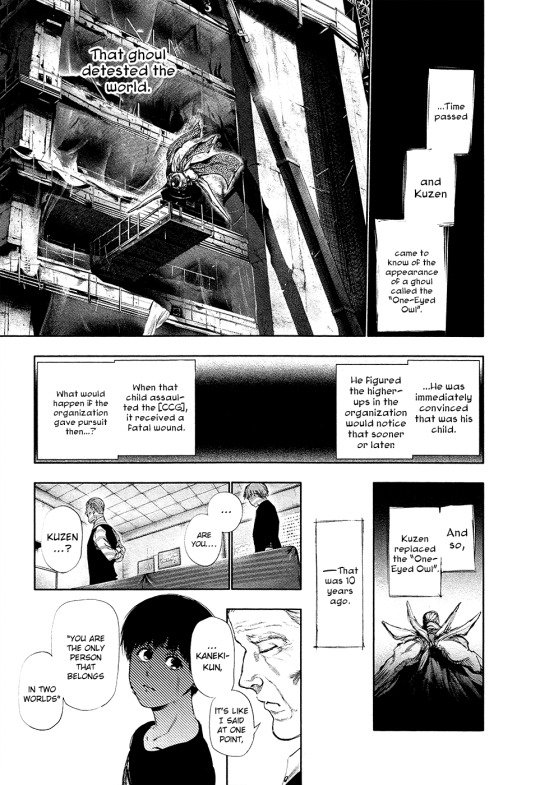
TG 119
Ishida actually demonstrates how this plan failed, but lets go over this story, because there’s some obvious flaws with it.
So Kuzen leaves Eto in the one place that V will never find her. Inexplicably, Eto just comes out of nowhere, “filled with hatred of the world”, and decides to attack the CCG. During these attacks, she receives a lethal wound. Fearful that V might pursue Eto in addition to the CCG, Kuzen becomes Eto’s substitute and attacks a random CCG base, receiving a lethal wound himself.
Okay, lets start with Eto’s motivation for her attacks. This is only going to be briefly covered, because the Eto/Touka parallels post covers this attack more thoroughly. Eto didn’t just pop up out of nowhere, as we know, she was actively being hunted by V and the CCG to begin with.
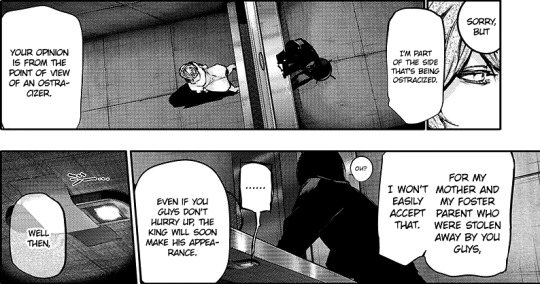
TG;re 66
Noroi ended up like Noro because V killed him. Shortly thereafter, as coincidence would happen, the CCG decided to do a “whack a mole” operation where they run into Eto at the specific coordinates they were sent to investigate in the deep section of the 24th Ward. It really can’t be stressed just how low the odds of this are.

TG;re 127, TG 80, TG 95
The Goat base in the middle of the 24th Ward in the D sector was 5 kilometers below the surface. The place they were attempting to escape to by going deeper was E14. Sector F124 is described as being part of the “deep”. We’re not given any reference points, and because V14 was just below the surface, it’s not necessarily linear. However, Eto was still located over 5 kilometers beneath the surface at the minimum.
The 24th Ward is a highly confusing, inconsistent labyrinth that is incredibly hard to navigate. And yet somehow, inexplicably, Marude’s team happen to run into Eto in the deep section they were sent to investigate. The implication here is that V failed their mission of killing Eto, and then tried to follow up with the CCG to kill Eto.
Why do I say the CCG’s battle with Eto occurred shortly after Noroi was killed? It’s simple.
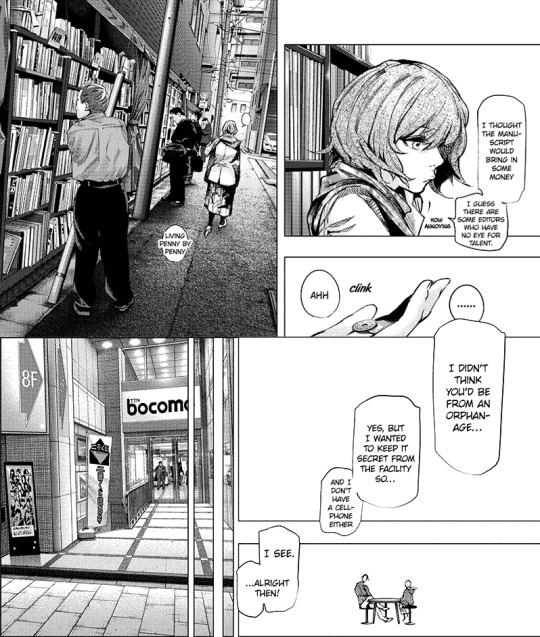
TG;re 62
Noroi isn’t present with Eto when she is attacked by Marude’s team. You’d think that as her protector, he would be. Even Noro isn’t mentioned at any time for the original Owl campaign, despite being a known as a powerful fearsome ghoul of Aogiri. Eto’s also explicitly a penniless orphan right after her rebellion.
This is the first sighting of the One Eyed Owl and Eto cited both her mother’s death and Noroi’s death as a reason she cannot accept V, and Eto’s battle with Kasuka Mado is a parallel to Touka’s and Hinami’s fight against Kureo Mado, wherein Eto plays the part of both Hinami and Touka.
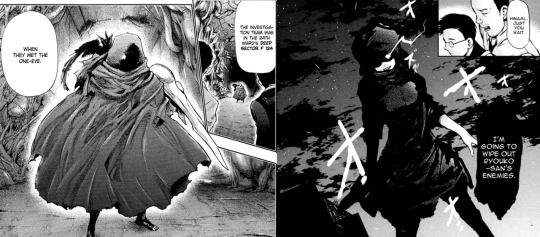
TG 124, 16
Eto didn’t just pop out of the abyss a fully formed kakuja that just hated the world. She didn’t even have a kakuja when she started her campaign, it’s shown as just a kagune. She was provoked by the the world controlling fascists that were intent on killing her and even went looking for her in the place that her father said would protect her from them to begin with. Kuzen knows, even after he “protected Eto”, that V was still pursuing her. We know this because he explicitly says so.
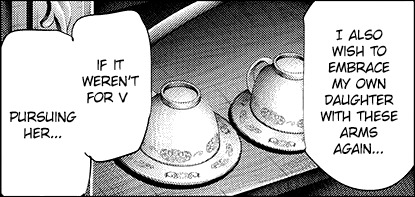
TG;re 71
So, lets move on to the part where Kuzen says he protects Eto. Eto receives a “lethal” wound…
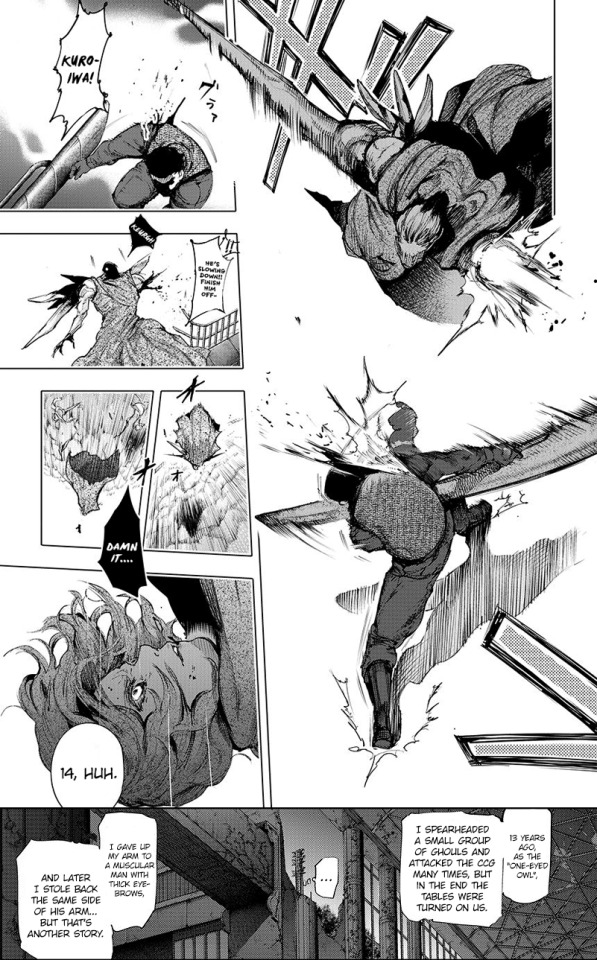
TG;re 61
…that isn’t lethal to a kakuja one eyed ghoul. She literally lost an arm. It’s just damaging her combat ability to the point she was forced to run against multiple special class level investigators with reinforcements on the way. This type of injury is a non issue when it comes to “survival” to someone like Eto, who can, for example, be sliced in half and then chucked off the top of a skyscraper and survive. A ghoul’s regeneration is only stopped when their kahukou is severely damaged.
Then Kuzen takes her place without informing her or coordinating with her, and then also receives a “lethal” wound…

TG 69
And this somehow makes V and the CCG stop pursuing Eto because why, exactly? What changed here? If anything, shouldn’t the CCG and V be more enticed to go after the Owl, as it just received yet another supposedly lethal wound, if said lethal wound was really considered significant to begin with? It’s not like Kuzen immediately stepped in minutes after Eto received her wound and covered for her while she escaped. She explicitly escapes on her own.
Lets look at the logic here from two perspectives, one where Eto is in hiding and the CCG and V don’t know her identity, and one where she’s in hiding and they don’t.
If Eto was in hiding, and CCG and V didn’t know who or where she was, they wouldn’t be able to find her immediately to finish her off anyway. She’s in no immediate danger danger of being attacked as long as she’d not found. In that case, Kuzen’s attack is pointless. Actually, it’s less than pointless - it’s pinning an attack she had nothing to do with on her, and giving the CCG valuable anti-Owl experience to use against her due to the similarities of their kakujas.
If the CCG and V does know who she is, then it doesn’t matter if Kuzen attacks again. This attack doesn’t change the fact that, in this theoretical scenario, Eto’s identity has been exposed. Kuzen’s just getting into another fight that is pinned on Eto and changes nothing.
How does this stop Eto from going on the offensive again and running into V or the CCG? What’s stopping the CCG and V from going after Eto while Kuzen’s faking his attack? Now that Kuzen just ran into some random fight completely unrelated to Eto and received a “lethal” wound, how will he be able to help Eto if she is attacked? The answer is “it doesn’t do any of that”, because we know what ends up happening.

TG;re 86, 69, 52
Arima engaged Eto so close to the time frame that he engaged Kuzen, you can even see that Eto hasn’t even gotten enough time to regenerate her arm yet. Eto was made into a figurative quinque of Arima’s at the age of 14 because Kuzen’s attempt to protect her had no logical way of doing so.

TG 139
Because Arima wasn’t referring to a replacement for IXA here when he said he needed a quinque. Because Kaneki was not literally a quinque he went around killing ghouls with. Arima was referring to a new metaphorical quinque to replace an old one. The old one being Eto.
This isn’t fridge logic, this is something Kuzen should have thought about immediately, and it’s not like he didn’t have time. Kuzen says that he immediately knew that Eto was his child, and consider the description of the Owl campaign.

TG 69
Kuzen had months to think of a plan to help Eto. This was what he decided to do. Kuzen’s plan was liable to fail. It never made sense to begin with in any way, shape, or form to accomplish its goal to save Eto, and so of course it didn’t. Why would it? Kuzen’s not solving any of Eto’s problems - making her feel loved, actually protecting her, giving her guidance.
If it weren’t for Arima secretly hating V and his job, and Eto telling Arima she wants to “fix the world” she would have been killed. Eto survived because of Eto. Lets compare this to Touka, who was in a similar situation with Hinami
If you’re wondering “what should Kuzen have done?” the answer is to ask Touka, who actually succeeded at her goals.

TG 23
I talked above how Volumes 2 and 3 of Tokyo Ghoul are effectively a parallel between Eto, and Touka and Hinami. It’s well known that Touka’s creation of ;re was meant as a parallel for Kuzen’s creation of Anteiku. There’s a reason for this. Lets take a look at how Touka handles the situations with Hinami and Kaneki that Kuzen’s also in, shall we?
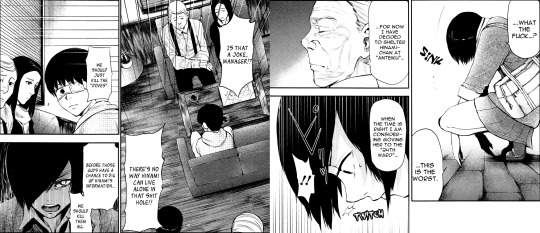
TG 16
Kuzen left Eto in the 24th Ward. He tries to do the same with Hinami. Immediately, Touka gets enraged. You can’t just leave an orphaned 14 year old alone in the 24th Ward. The 24th Ward is considered one of the worst places in Tokyo Ghoul to live, let alone for an orphan. Children shouldn’t be left unattended in general…
While Touka’s reaction here (”Kill all the doves”) is an overreaction, it’s an overreaction to Kuzen’s overreaction. And yes, this is an overreaction. What logical reason is there for Kuzen to throw Hinami in the 24th Ward? I think it’s safe to assume it relates to the CCG confrontations that he gives moments later to Touka’s idea of killing all of the CCG.

TG 16
That still doesn’t make sense, though. Because even if he’s not on the radar because of his connections with V, Kaya, Koma, and Yomo are. A ghoul’s face being exposed is a big deal, yes, but the investigators had no knowledge of what Hinami actually looked like, and a simple investigation of his own could have solved that.
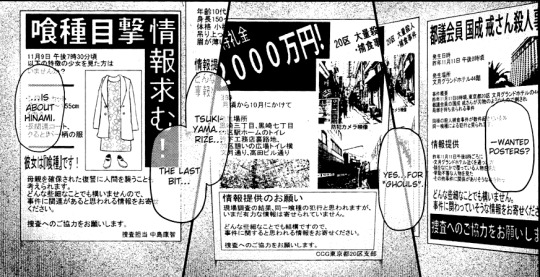
TG 20
To clarify this description is so vague as to be meaningless. It’s basically saying “this vaguely child sized person with a clover dress and a coat”. Hinami literally has to change her clothes and survive a few months and she’ll no longer fit this description in any way. In the end, there is a middle ground between these two sides - Hinami stays with a member of Anteiku and they protect her, and that’s exactly what happens anyway.
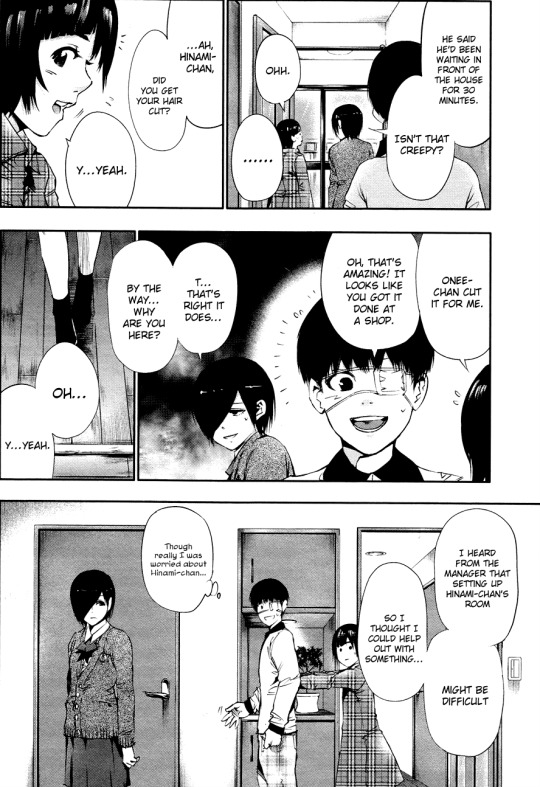
TG 31
Oh and also Hinami gets a haircut, grows because she’s still growing, and changes her clothes. Because she’s alive. The thing is, this is such an obvious and simple answer to the problem at hand that it should have been Kuzen’s first reaction. Touka’s not realizing this immediately is logical. Touka herself has a history of losing people to the actions of the CCG - her own parents directly, and indirectly Ayato. Touka being blinded by her rage is understandable.
Kuzen, meanwhile, has no excuse. He’s many times her age. He’s coolheaded enough to realize not to attack the CCG, and he’s old enough that he should have experience to realize the flaws in his logic. Again, like with his decision to “help” Eto, this is not a split second decision.

TG 17
As a result of him not doing so, the very thing he was trying to avoid, Doves dying, ends up happening anyway. And the very result he was trying to avoid, vengeful Doves, follows. This is a pattern with Kuzen’s actions. His actions keep leading to results he doesn’t want, because his actions have no logical basis of succeeding at anything he claims he wants them to.
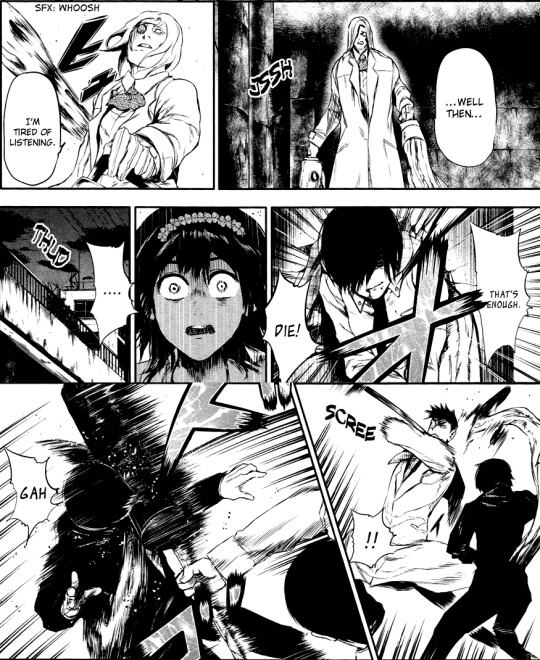
TG 25
Kaneki, Touka, and Hinami subsequently are all almost killed. Kuzen and Yomo eventually show up, but they were mainly preoccupied with Kaneki and in the case of Touka it wasn’t even a last second save Hinami did. Kureo Mado’s quinque was in the midst of being swung meters away aimed at Touka’s head when Hinami cut it off.
All because Kuzen lacked the foresight to think that abandoning an innocent 14 year old in a hellhole was a bad idea. And he really should know better. Kuzen left Eto in the 24th Ward after Noroi died and he got… obvious results.

TG 32
Lets move on to Kaneki’s encounter with Tsukiyama. We’ll start this by making an observation of Touka warning Kaneki about Tsukiyama. This might seem insignificant, but it’s not. Touka’s warning almost worked, were it not for Tsukiyama’s cunning and Itori’s goading, Kaneki would have likely avoided the Gourmet Arc. It’s rather interesting comparing this to both Itori and Tatara’s commentary on Kuzen, where they both make a good points about Kuzen’s treatment of Kaneki.

TG 34, TG 54
There was literally no good reason for Kuzen to not warn Kaneki of the impending danger around him. We know Kuzen’s reasoning here, according to Yomo, it’s to keep Kaneki from getting caught up in the confusion. The problem is that’s already too late. Kuzen already knows Kaneki’s mixed up in V’s business, the CCG’s business, and the Clown’s business, whether he likes it or not. He knows, and decides not to tell Kaneki.
To get back to Tsukiyama, Kuzen’s reaction shows, once again, a lack of learning anything.

TG 40
This is one of the many times that Yomo starts to questions Kuzen’s decision, but doesn’t fully follow through with the thought process. And it’s hard to do so, which I’ll get into later, because Kuzen has many redeeming qualities. But that doesn’t change his downsides. Remember, his inaction almost resulted in three of his people getting killed, and resulted in two members of the CCG getting killed.
Tsukiyama himself literally almost just had Kaneki tortured to death and eaten alive by a group of hungry ghouls. They just finished having a conversation with Kaneki about this very issue. Yomo is clearly worried about Kaneki, and he has a very good understanding of his strength because he’s been training him. This is not stuff that has not already come to pass - this is stuff that has passed.

TG 40
Que Touka, almost as if it’s a joke and she was listening in on them. As if her expression directed at the discussion and Kuzen’s poor decision making, and not Loser. As if it’s meta commentary.
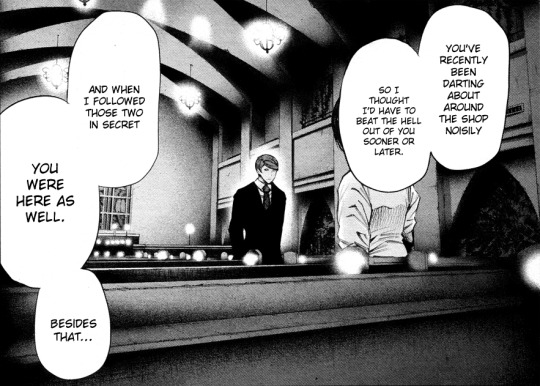
TG 42
Touka picks the opposite decision that Kuzen does, and is in the right. Had she not shown up, Tsukiyama would have likely eaten Kaneki and Kimi, and killed Nishki. You can’t really be hands off when the guy in question is trying to kill one of your people, you know? But Kuzen doesn’t see it that way.

TG 18
You could say that, in a sense, Touka is paying Kaneki back for his own disregarding of Kuzen’s direct orders saving her in the process. One of the patterns that goes hand in hand with Kuzen constantly getting the worse outcomes is of course, characters going against Kuzen’s will and getting improved outcomes.

TG 59
Kaneki’s rescue from Aogiri is actually an example of Kuzen doing the right thing. Still interesting to note that Touka immediately knows she’s going to save Kaneki and makes it known, which contrasts with Kuzen’s malingering on the issue.
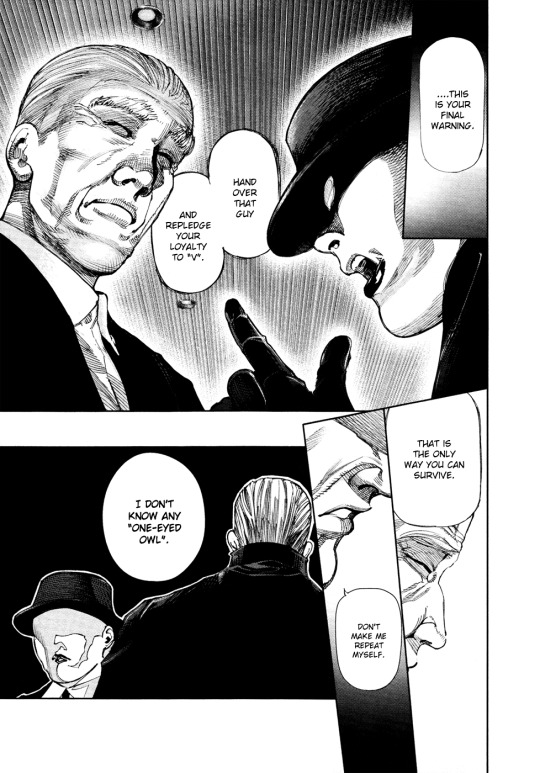
TG 124
Kuzen’s stand at Anteiku was also just pointless. He frames it as a stand against V for Eto when Kaiko chats with him, but how does fighting at Anteiku do so? How does this protect or help Eto? How does fruitlessly dying against the CCG stop V from going after Eto? Again, it doesn’t.
Even if Kuzen was going to be chased by V, we know you can avoid them for years with occasional fighting (see: Shachi, Noroi and Eto, Rize pre-Binging). And if you actually want to fight them, there are better means than playing defensive against a bunch of CCG agents protecting literally nothing.

TG;re 140, 65
It’s not like this is like Rushima and Coachlea, where the goal is to split the forces of the CCG to enable a rescue operation. The diversion Aogiri Tree made was an absolute necessity for the success of the Coachlea raid. And it’s not like there are countless numbers of noncombatants who couldn’t defend themselves if Kuzen didn’t fight, like in the 24th Ward. The stand made there was a necessity to stop the slaughter of civilians.
Kuzen didn’t have to fight, and neither did the Dobermans or the Apes. A lot of people just ended up dying for no reason. Anteiku was just a place that could have been rebuilt, which is exactly what the rest of the Anteiku crew sans Kuzen and Kaneki did. It was literally a building, the people inside the building are what mattered. And Kuzen decided they had to die and then effectively blamed it all on Eto. Because regardless of whether or not that’s what he intended, that is what he did.
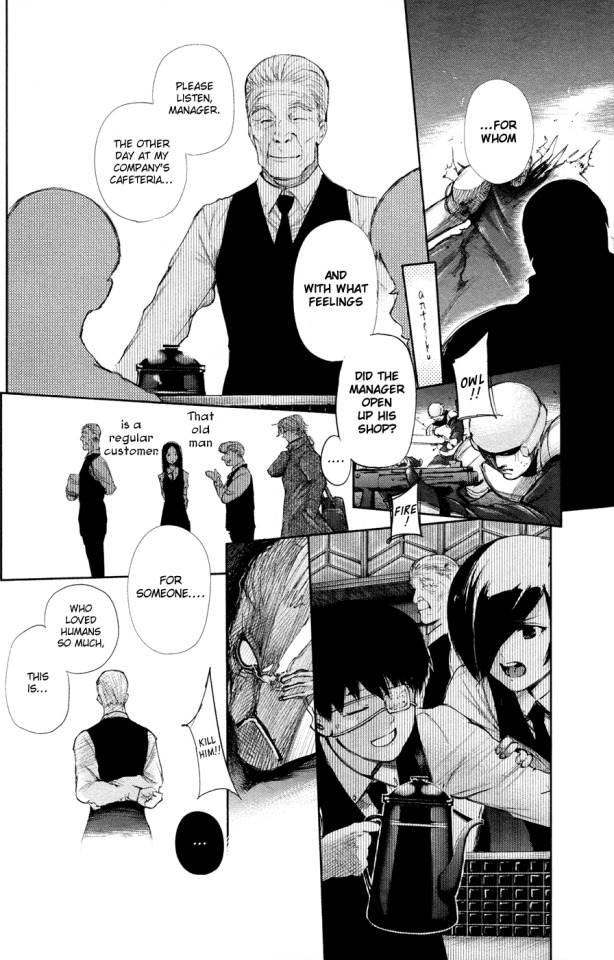
TG 128
Kaneki is clearly implying that this entire battle, this entire fight is entirely Eto’s fault here, he’s just not saying her name. We’ll get back to this later on, because it’s important, and it explains a lot of the Anteiku/Eto interactions.
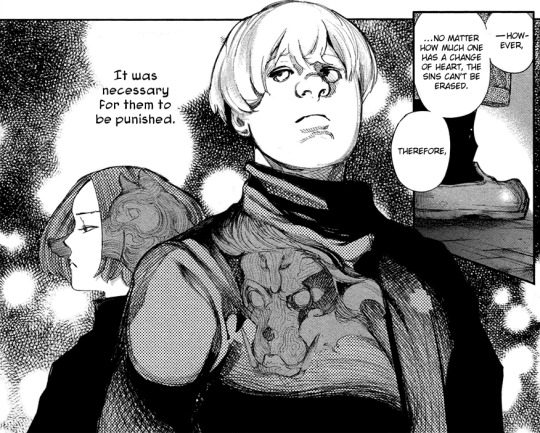
TG 130
Now the Anteiku raid itself. Kuzen framed the entire thing as a fight for Eto. He brings Kaya and Koma along with him, but as noted above, this doesn’t actually help Eto in any way. As noted above, if Kuzen just ran away, hid himself, anything, really, there would be no consequences to anybody.
Touka attempting to rush to Anteiku was a foolish move, and it makes sense that Yomo stopped her. The problem is Yomo’s response to Touka’s response. Touka’s the only person in this situation who’s actually shown putting any thought into the situation, and yet she’s being belittled for it.
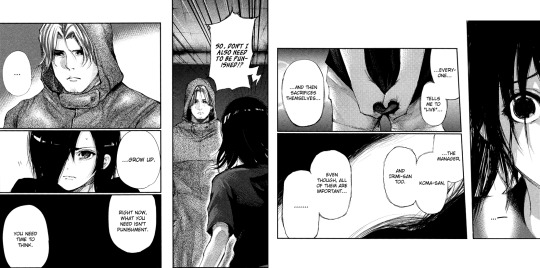
TG 130
Kaneki, Kaya, Koma, and Kuzen are all on suicide missions for no good reason, hoping that things will work out. Touka is desperately trying to understand, but can’t, because there is no logical reason for this to happen. People are just dying over a literal building. Touka’s objection destroys Kuzen’s argument here about redemption through death and how arbitrary he makes it. Yomo really has no good responses to Touka’s objections here, he just deflected with saying she’s too young to understand the thing that he himself doesn’t understand. He even outright agrees with her.

TG 130
He tries to play off her being confused by a senseless action leading to countless deaths as her “throwing a temper tantrum”. He adopts Kuzen’s policy of inaction once again, even though he feels this is all wrong. He even acknowledges this years later.
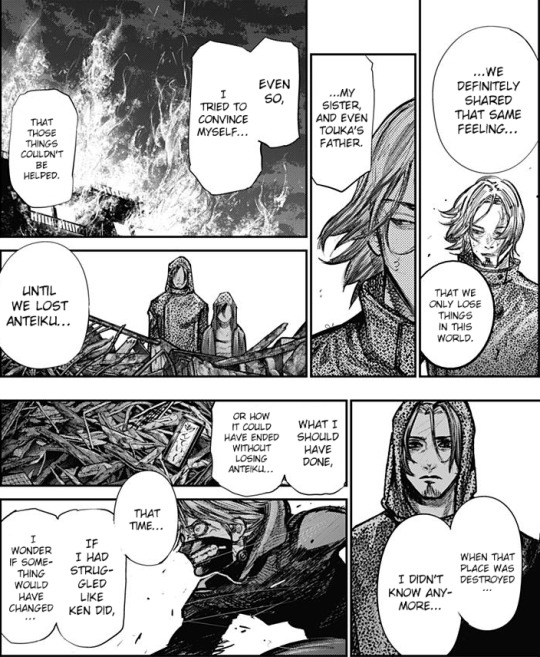
TG;re 171
The problem is that he still doesn’t see the pointlessness of Anteiku, here. No one does. Even Nishki and Kaneki were trying to rationalize the battle as Kuzen trying to cause enough chaos that the Anteiku crew would not be found.
“Or how it could have ended without losing Anteiku…”
We are literally shown how to have ended the situation without losing Anteiku, outside of a name change. It’s literally a situation that Yomo himself was in just months before in universe. It’s just that Yomo can’t bring himself to acknowledge the reality of Kuzen’s actions. He somewhat seems to have started to understand it towards the end of ;re, but not quite. On some level, he’s still trying to justify the battle. “Maybe if I had fought in that battle” is just that. The right answer would have been to… not fight.
So, what was Kuzen’s real reason for the battle of Anteiku?
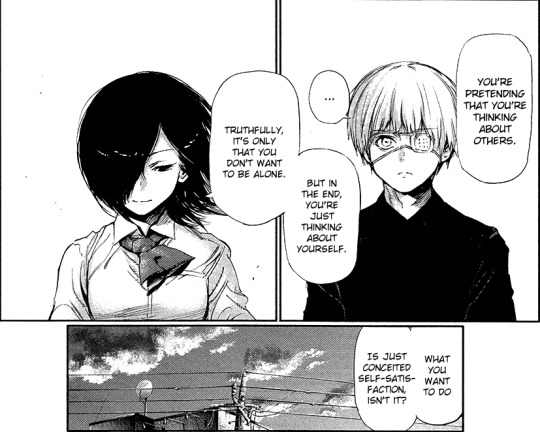
TG 120
I think the answer is the same as it is for many characters in this series. We hear it from Touka, who rather purposefully shares many parallels with both Kuzen and Eto, talking to Kaneki, in an arc that is a parallel to Kuzen’s own. Saying this to Kaneki in the chapter right after Kuzen tells his story to Kaneki, and right before the destruction of Anteiku.
Kuzen didn’t establish Anteiku solely for Eto’s sake. He did it so he could say to himself he founded Anteiku for Eto’s sake. Kuzen didn’t fight the CCG for Eto’s sake. He fought the CCG so he could say he fought for Eto’s sake. He did it for the self satisfaction, a way to soothe the guilt.
Because Kuzen , just like Kaneki, hated being alone. And so he starts doing anything he can to stop from being alone, while paradoxically wanting to die while living as long as he can, like Kaneki did. Anteiku is a parallel to Kaneki’s story as a whole.
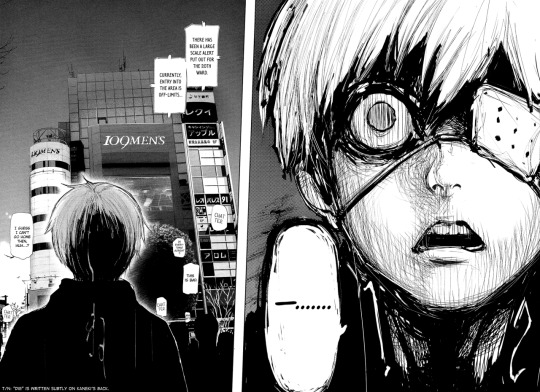
TG 126
Just as there’s a reason Eto was hunted down and forced to work for Arima (and yes, she’s forced to; the moment Arima discovered her identity, she has no choices left) despite Kuzen’s “protection”, there’s a reason that Anteiku was destroyed despite Kaneki’s “protection”. Because destroying Aogiri doesn’t solve the underlying issues that cause threats to Anteiku to begin with.
It doesn’t break the bird cage caused by V, it doesn’t solve the issues between humans and ghouls, it doesn’t even remotely encourage that. Destroying Aogiri doesn’t even solve the immediate threats to Anteiku in Tokyo Ghoul - V, and groups that work with them, like, say, the CCG. The groups who actually targeted Anteiku and actually destroyed it, and not just a theoretical that Kaneki proposed in his head.
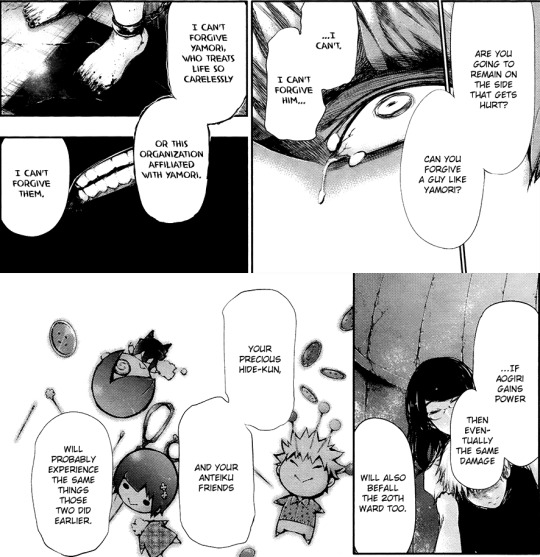
TG 63
Because Aogiri never intended to attack Anteiku, a few individual members did of their own accord. Think about it this way: If they were intending to destroy Anteiku and kill all of its members, why would Ayato be in Aogiri when his goal is to protect Touka? There’s nothing that actually indicated that Aogiri had any interest in Anteiku outside of just checking out Kaneki’s worthiness as a possible One Eyed King.
Tatara, Eto, and Arima never even intended for Kaneki to be tortured in the first place.

TG 54, TG 75
Tatara actively writes off Kaneki and gives him to Ayato, not Yamori. Ayato, as in the guy who angers Yamori, and who Yamori didn’t want to cross. The reason Kaneki was tortured was’t because of Aogiri using Yamori as a roundabout means to do so (why would they bother doing so in such a manner?), it was because of, primarily, Nico’s extensive machinations enabling Yamori to do so.
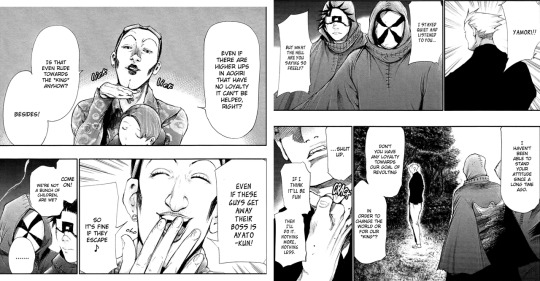
TG 58
Kaneki projected Yamori, a guy who has less in common with the average grunt of Aogiri as Kijima does the random grunt of the CCG, onto the rest of Aogiri Tree. Yamori was legitimately hated by the Aogiri members as a whole, this is made explicit on multiple occasions. Yamori also rather explicitly has literally no loyalty to Aogiri Tree. His motive? “it’ll be fun”.
Yamori torturing Kaneki was explicitly treason here, in the sense that he had to commit treason to do so. The only reason that the Bin Brothers didn’t try to fight Yamori was Nico and the oncoming CCG battle. We’ll leave this at that for now. However, it’s made clear that Nico was the one who enabled Yamori to torture Kaneki by stopping Kaneki’s and the others’ escape at every turn and being the one who lead Yamori to him in the first place.
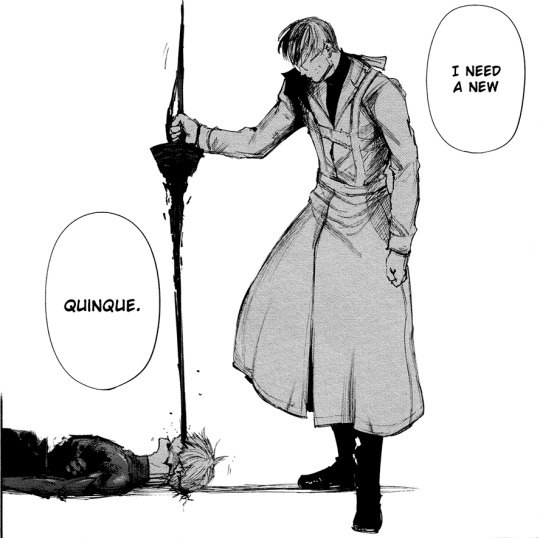
TG 139
The tragedy of the original Tokyo Ghoul wasn’t that Kaneki’s actions amounted to nothing because the CCG’s attack made Kaneki’s actions against Aogiri meaningless, and he decided to shoulder the burden of fighting everyone alone. The tragedy of the original Tokyo Ghoul was that Kaneki didn’t actually protect Anteiku, because his actions had nothing to do with protecting Anteiku. In the end, Kaneki ends up in an unwitting battle against the One Eyed King and is defeated before he can reach his goal of Anteiku. He fought a series of pointless battles against Aogiri, because a Clown set him up.

TG 78
That’s why Nico’s saying all this to Furuta in a chapter called “Diversion”. It’s… literally right there. Eto and Aogiri a diversion for Kaneki from his true goal: being loved and finding happiness. Nico even kind of just outright says they had Kaneki tortured because they wanted to see the changes a human goes through when they enter despair. There is a very, very good reason why Kaneki is always portrayed as being at his worst when he’s going after Eto in both Tokyo Ghoul and Tokyo Ghoul ;re.
They’re mentioning Eto indirectly here, and how she’s not the One Eyed King (Nico lied to Kaneki - not Furuta) to foreshadow quite a bit. The tragedy of the original Tokyo Ghoul was that Kaneki’s actions were meaningless the entire time, that he wasn’t actually fighting the real threats to his loved ones, and he learned the wrong lessons from his experiences.
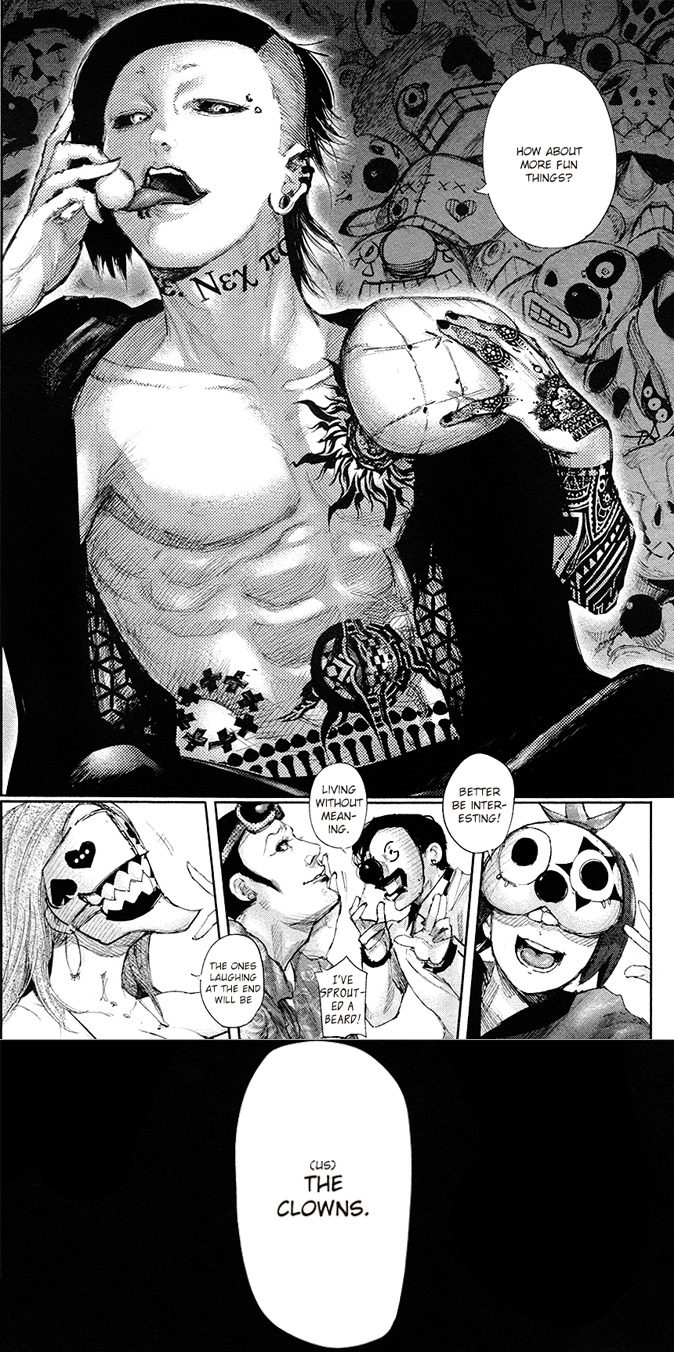
TG 143
That was the point of this entire scene with the Clowns celebrating at the end of Tokyo Ghoul. Like, they’re even referencing Yamori’s line here. Kaneki went on some random warpath against someone who is mostly irrelevant to his happiness and could have even been an ally to him (like Tsukiyama, or Nishki), who eventually became an ally to him in ;re, but not the actual threats to Antieku. Kuzen is the same as Kaneki. That’s how they parallel. The only difference between Kaneki and Kuzen is that Kaneki was tricked and misled, whereas Kuzen wasn’t.

TG;re 71
Kuzen is completely aware of this fact. He knows his actions aren’t actually helping Eto. That’s the subtext here, even if Yomo doesn’t pick up on it. Yoshimura even lampshading that, more often than not, he gets the opposite outcome than what he wants in his statements here.

TG;re 62
I believe this scene to be grossly misinterprreted. The question I usually see pop up here is “Why is Eto getting so unreasonable here, so ungrateful towards her father?” There seems to be this perception that Eto could just walk in through the front door, that Kuzen would just welcome her with open arms. But there’s nothing to suggest that he would.

TG;remake 1, TG;re 62
This novel Eto drops in front of Anteiku is about the longing for parents, or in other words, a family, while living in a hellish situation. Just look how long he lingers on the novel she drops in front of his door. This indicates the novel itself has meaning to him.
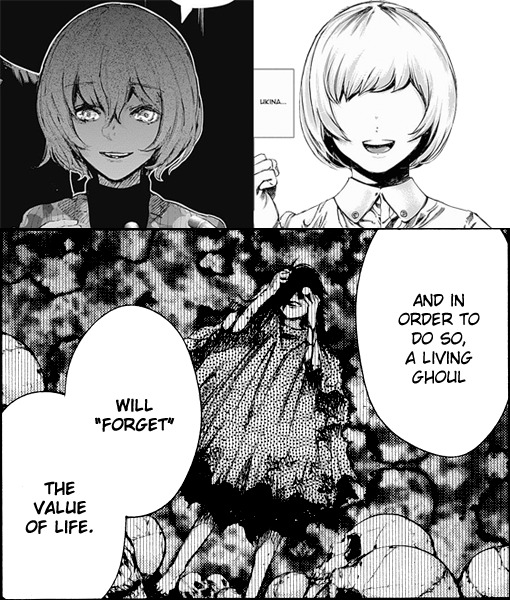
TG;re 63, TG 124, TG 119
Consider that Eto looks just like Ukina. Now consider that Eto makes public appearances and has her novels known around the world. Kuzen even imagines Eto in his mind’s eye during his speech to Kaneki. The implication here is that Kuzen is just as aware of Eto as she is of him. The other implication here is that Kuzen’s lingering on Eto’s novel because he knows she just walked by and dropped the novel as a message to him.
The real question should be “How does Eto know who Kuzen is?”

TG;re 71
The implication here is that Kuzen came forward to Eto. Given his foiling with Touka, and his intentions with Hinami, all point towards one thing: Kuzen’s last embrace of Eto? Wasn’t from when she was a baby. It was probably shortly after she published her novel. That is how he knows V is still pursuing her. That is why she is so angry. That is how Eto knows who he is. That is why Kuzen lingered on Eto’s novel for so long. Kuzen did with Eto the exact same thing he wanted to do with Hinami. Only with Eto, there was no one to tell him “this is wrong”.
Eto started working as a novelist as a 14 year old. Eto was forced to become a child soldier as a 14 year old, fighting a war against V, who controls the entire world, as a 14 year old. Not for her own selfish ends, not for simple revenge, but for the plight of her fellow ghouls.

TG;re 65
And Kuzen’s not helping her, he’s not taking care of her, he’s not taking notice of her, he’s not actually doing anything for her. The opposite of love is not hatred - the opposite of love is indifference. And Kuzen comes off as being completely and utterly indifferent towards Eto’s struggles. Eto’s writing novels about living through hell, because she’s being hunted by V, other ghouls, the CCG, and the only support system she believes she has at that moment is maybe Arima.
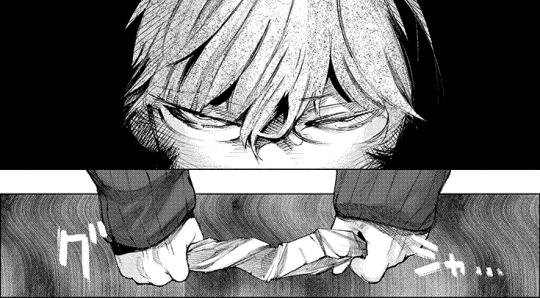
TG;re 62
So when Eto walks by Kuzen having a happy fun time with his new family, while she’s suffering alone, when she’s being hunted by V, she gets upset. And it’s completely understandable. She’s struggling alone.

(this image is from TG 125 and TG;re 71)
Kuzen wished for Eto’s embrace, to have a cup of coffee with her. He created Anteiku as a home for her, the name being an anagram of her name and her mother’s name; but in the end, it never amounted to any more than a wish. V was never going to go away without someone to stop them, and Kuzen had already resigned himself to never be able to do anything to beat them.
Therefore, Eto could never come to Anteiku. Kuzen referred to Eto using such terms with fantastical connotations, but simultaneous common usage, such as “wish” and “miracle”. Perhaps that was by design? Because he knew the arbitrary requirements he designed to be met could never be. These words would have immediate meaning to those around him as merely expressing desire; but in reality, they’re acknowleding it’s pure fantasy.
We’ll contrast Touka’s inaction with Kuzen’s inaction, because they’re two very different things. Both Kuzen and Touka made homes for Eto and Kaneki respectively to return too, and both avoided grabbing them and bringing them to those homes. But the reasoning here is polar opposite.

TG;re 42
Touka doesn’t want to bring Kaneki to this home she made for him because by being part of the CCG, he’s protected. The investigators know his identity, and will search him out if he runs away. Being in CCG custody and under their protection? It’s the safest thing for him. Of course, if he does run, he will always have a home at ;re. Touka is actually ignoring her own wishes, her wish for Kaneki’s return, because she thinks this sacrifice is necessary to keep Kaneki safe - because she believes he’s safer without her.
The other part of this equation is, of course, Haise Sasaki and the members of the CCG. Haise Sasaki is just as much a part of Ken Kaneki as any other “personality”. Haise is not something that can simply be removed from Kaneki.

TG;re 121
Which is something that holds to be true. The moment “Haise Sasaki” became “Ken Kaneki”, Akira Mado stopped associating with him. Because names are not without meaning. Memories are not without meaning. The thing that brought Kaneki to Touka, was the thing that took away Haise from Akira.
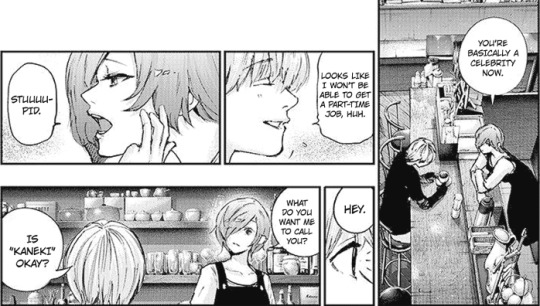
TG;re 99
And in the end, when V and the CCG does come for Kaneki, even after his identity has been exposed and his face plastered all over television? Touka has Kaneki stay at ;re, fulfilling her promise.
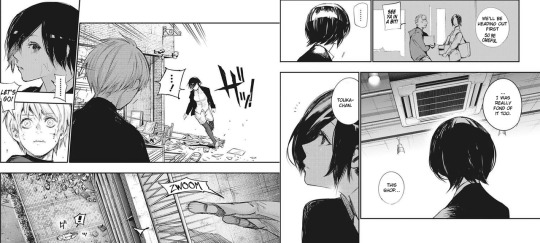
TG;re 124, 123
And Touka is also forced into a situation where she learns there’s an army on its way to her location. So what do she and Kaneki do? They don’t fight a pointless battle they run, sending Kaya and Koma aways instead of forcing them into a suicide battle. While Touka is fond of ;re, she recognizes ;re as what it is: a building. Something that can be rebuilt, an inanimate object. Of course, things don’t go as planned, and Mutsuki, Aura, and the Oggai show up to fight Kaneki.
The violence Kaneki and Touka used here is proportionate to the threat they faced until they can find an opening to leave. Because the important people were sent off. They had already left, because that’s the logical thing to do when you find out an army is approaching your position and there is nothing of strategic value in the place you’re staying at.
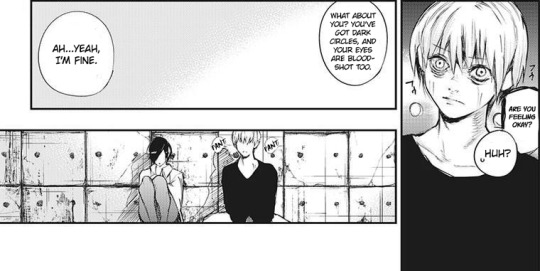
TG;re 130
And even when the CCG followed, Touka still stayed with Kaneki. Compare this to Kuzen’s response to V and the CCG hunting for Eto, his teenaged daughter, who’s identity is not truly known by anybody. And hey, even if they come for you, guess what? Touka has the answer there, too. Touka had an objectively harder job than Kuzen at this point, because Kaneki’s face is now being plastered all over the news. Eto is a… relative nobody. V is hunting her down, they’re trying to kill her, but it’s not like her identity is known to such an extent.
Many people recognized Touka’s parallels to Kuzen with regards to ;re and Anteiku, but I’m not too sure I agree with people about what they meant. The reason Touka succeeded in making a home for Kaneki and Kuzen failed in making a home for Eto wasn’t because Eto “couldn’t understand Kuzen’s love for her”, but because Kuzen never made the right decision, and moreover, knew that in his heart. Touka makes this explicit by rebuffing every decision he makes at every level. That’s why she’s a better manager.
That is not to say that Kuzen didn’t make some very good decisions, because he did.
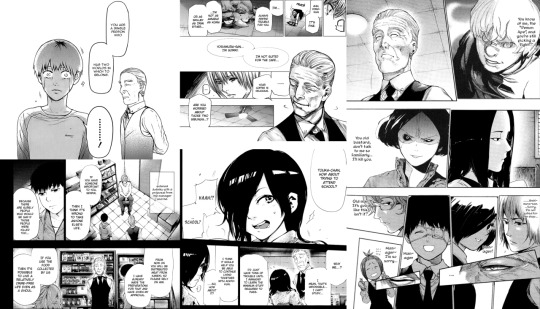
TG 9, TG;re 71, TG 125, TG 71, TG 47
Kaya and Koma were, at one point, violent ghouls who fought others often. Because of Kuzen’s leadership and guidance, they calmed down. They joined him, and became more peaceful. And not just them, but those who followed them.
Or lets use Yomo as another example. Kuzen saves Yomo’s life from Arima, then brings him under his wing. Mellows him out. This is going to be a pattern with Kuzen. Kuzen also saved Yomo’s niece and nephew.
For Touka, Kuzen acts as her father figure and sends her to school. Touka is noted to have “cooled” a lot from this. She established one of her most important relationships here.
For Kaneki, he gives him a family. He tells him, at his weakest moment, he has a place to be. Anteiku is a place of belonging Kaneki discovers when he, as someone who always felt he had nowhere to belong besides Hide, believes he has become a creature alien from both worlds.
He also gives Nishki a way to have relatively moral food. Nishki is also mellowed out by Kuzen’s actions. He becomes far more accustomed to peaceful interactions with others.
It’s just that, if you notice the pattern, none of these good decisions have anything to do with Eto. And indeed, good decisions make people more willing to make people overlook bad decisions. But it doesn’t change the fact that he failed Eto. It doesn’t change the fact that he didn’t help her. It doesn’t change the fact that he got people killed, because of decisions that had immediate, easily seeable answers available to him. But, a reoccuring theme of Tokyo Ghoul is this:
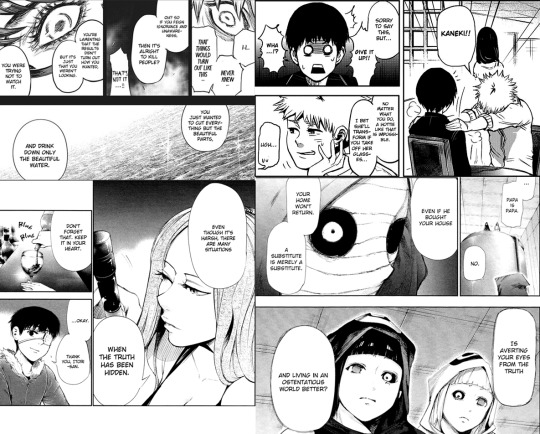
TG;re 159, TG 1, TG 47, TG 98
People really, really, really don’t like to acknowledge the bad. They only want the good. That there is a hidden truth to the world, a darkness, that no one wants to face.

TG 54
It’s best encapsulated by Kaneki’s statement here. Kuzen hid a ton of information from Kaneki - information Kaneki desperately needs. But at the same time, Kuzen gave Kaneki food, a family, counsel, and the ability to do things. Kaneki has very good reason to have doubts in Kuzen, but he writes it off as just his irritation and confusion. Irritation and confusion that was caused in part by Kuzen’s hiding of information from him.
As for why Kuzen treats Eto the way he does? He can say it’s V, but I think it’s more than that. Kuzen has some interesting wording that he uses when he goes on his speeches, pertaining to one thing: “Birth” and its negative effects.
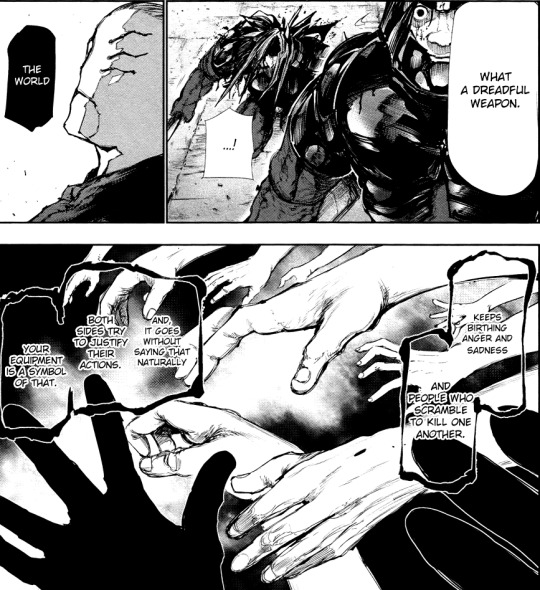
TG 78
He first says it here, relating birth with anger, sadness, death and mass murder. But the best example, the one that gets cited as being “such a good speech”, is the one I want to focus on:

TG 126
“from the instant we are born, we are evil”
His speech itself is in reference to an interpretation to the idea of the Original Sin, which is literally the chapter title. The Original Sin, in the way Kuzen applies it, is the belief that all people are born filled with sin, more or less as Kuzen describes it. This speech itself comes off as kinda cool when you consider how it contrasts with his managerial position at Anteiku, his attitude, and his past, but as Kuzen describe the Original Sin, it’s arguably literally meaningless.
“acts which snatch things away are equally evil”
“life itself means evil”
Kuzen’s statement equates, say, Donato stealing children’s lives with Amon stealing donuts as a child. It’s honestly a really depressing speech. The speech comes off as someone who was forced to kill countless people to survive, and then willingly killed countless more at the behest of a conspiracy, attempting to justify themself. A conclusion so meaningless that “death squad member” is equal to “newborn baby”, which is literally the point, because he’s clearly trying to rationalize his treatment of Eto here with this philosophy.
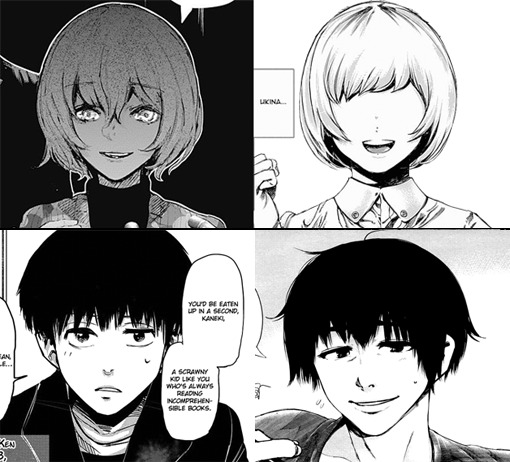
TG;re 63, TG 119, TG 1, TG 70
Both Eto and Kaneki greatly resemble Arata and Ukina. Kuzen’s killing of Ukina is the darkest moment of his life. It is, quite literally, the only time that we ever see Kuzen shed a tear - that we ever see Kuzen truly express vulnerability to such a level. For Touka, this is a reminder of the good times she had, the more simple times. The time she spent with her father was special to her. Touka has positive memories of her father, who kept his darkness hidden from her; Kuzen has negative memories of Ukina, who he was forced to kill. The resemblances carry emotions that are completely contrasting, and further explain Kuzen’s avoidance of Eto.
“I know that I am ‘evil’, and so are you“
Based off of what Kuzen’s wording here and his mind’s eye view of a “violent ghoul”, he associated Eto with death, with destruction, with evil.

TG 40
Because when he’s describing a ghoul committing senseless murder, he’s thinking constantly of Eto. Eto’s body language actually contradicts his descriptions of course, showing immense stress. This is honestly just Kuzen projecting, which you realize in chapter 119, because he’s describing himself when he was younger and thinking of Eto. He’s literally seeing the worst of himself in Eto. And Eto also sees the worst of Kuzen in herself. That’s part of the reason why she wrote the Black Goat’s Egg.
Kuzen’s rebellion, in the form of the Battle of Anteiku, did nothing that couldn’t have been done better. No one ever got the chance to directly call Kuzen out for what he did, to try to get him to reconsider, Touka being the only one who even considered it, at least not in a way were it was trying to justified his actions. He staged this massive battle that legitimately served no purpose. All because, ostensibly, “for Eto”.

TG;re 86, TG;re 52, TG;re 69
The One Eyed King plan is something that has a limited time table to complete. And if Eto doesn’t do what Arima says, then he could force her to become the One Eyed King by attempting to fight her and killing himself like he did against Kaneki. Which is something Eto doesn’t want, because she thinks everything she touches dies. Because she thinks she’s toxic. I went over this in the Eto’s novels post, but the Black Goat’s Egg is basically about Eto’s self loathing and belief she’s toxic.
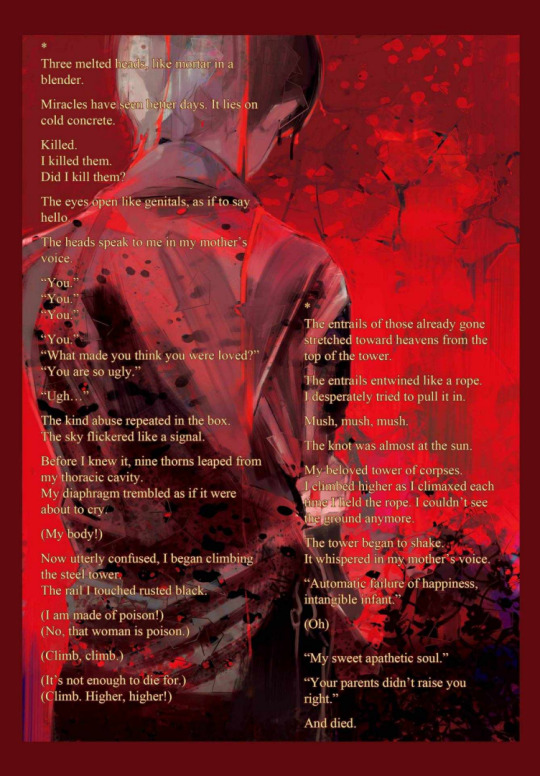
TG;re Vol 5 poem, Black Goat’s Egg excerpt

TG;re 74
There is some inference here, essentially the idea that Arima gave Eto the same choice he gave Kaneki when it came to Touka - it’s not explicitly stated, but there’s some hints. I understand there’s the idea that Kuzen and Eto made no attempt at reconciliation, and that’s actually understandable. But… I’m pretty sure the subtext is they did, because the literal text is that she’s bothered by his passing.
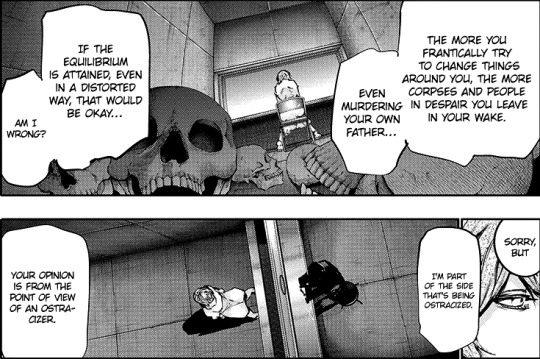
TG;re 65
Furuta brings up Kuzen here, and the death of those around her because of her actions. Something that really grates on Eto. Eto has no real response to Furuta’s points, because these things actually bother her, which is why she just responds with “I’m on the size of the weak, you’re on the side of the strong”. It’s a deflection about
Eto is planning on dying here to atone for her sins. She doesn’t think she’s someone worth living, worth saving. That’s why she smiles in the same manner as Kaneki after making a request for someone to do something they’re already planning on doing, for Kaneki asking Urie to save Mutsuki, and for Eto asking Kaneki to fight Arima. Eto is actually paralleling Kaneki throughout his “Reapernki” and “Shironeki” phases, and these parallels run back 13 years.
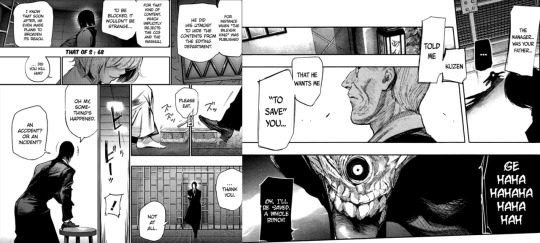
TG;re 68, 55
You’ll notice there was an awkward pause here from Eto that went completely overlooked during this conversation when Kuzen was mentioned by Kaneki. This isn’t her being angry. This is her not having anything to say when he immediately brings him up, the rest of her conversations with Kaneki being constant quick witted banter (that devolves into mentally ill rambling shortly after this, but).
This awkward pausing is actually repeated later, with Eto’s human father figure, Shiono. An awkward pause, followed by a joke. These scenes aren’t a perfect parallel; but they’re rather close.

TG 99, TG;re 119
There’s more hints of course, and it relates to Rize’s treatment by Furuta. You can actually see Rize here and the immense agony she is clearly in. This is a clear cut indication that Kanou donors aren’t given any type of pain supression system, and that more over, they’re fully aware of their surroundings.
Why is all of this relevant?

TG 143, 124
When you cut to Kuzen, if you look closlely you’ll notice that he’s smiling. And it’s in a panel that was paralleling an earlier panel, where he’s miserable when talking with Kaiko (with the panel mentioning Eto’s existence is a betrayal of V), but smiling next to Eto. Pretty hard to do when your body is hooked to machines and being harvested, right? The idea that the last panel we see of Kuzen was drawn this way for no true purpose seems rather unreasonable, no?
You can’t peacefully smile in immense pain like that. But you can if you’re not in immense pain. Kuzen would logically be on painkillers here, and since Kanou didn’t do this for Rize, it would logically be at Eto’s request. Is that a good ending? No. And this also doesn’t excuse what Eto did here. I think that will probably be hard to swallow given the general assumptions surrounding Eto, but I didn’t agree with the idea that Eto didn’t care for her father, because her actions towards him don’t make sense otherwise. I’m also not sure how else someone going through a painful procedure would smile and be completely asleep outside of painkillers.
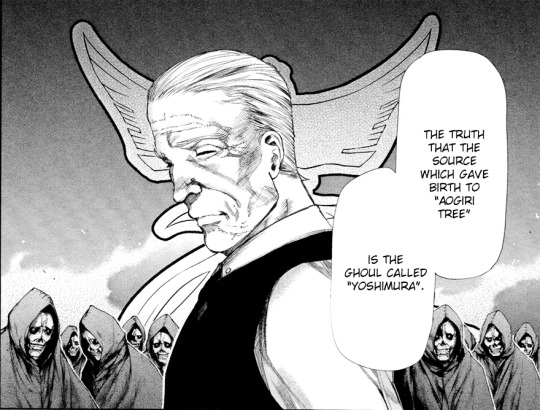
TG 99
It further explains why Furuta knew to use Kuzen against Eto. If Kanou knew Eto cared about killing Kuzen, he would have probably mentioned that to Furuta. Kanou and Furuta were consulting constantly. Kanou knew, back when Kaneki confonted Kanou in his lab, that Kuzen and Eto were related by blood. Kanou had been aware of Kuzen and Eto’s relationship from the beginning.
To get back to Eto, the problem here is that Kuzen’s speech, his entire rebellion against V, is being framed as for Eto, but because how horribly he pulls it off it ends up being against Eto. Because no one actually benefited from the Anteiku battle outside of V; it was demonstrably meaningless in its objectives. But in the end, it wasn’t meaningless to the people it left behind.
Because everyone who survived Anteiku? They all worshiped Kuzen. And Kuzen just staged this massive fight, which meant nothing and did nothing, while framing it as for his daughter who they don’t know. The daughter they’ve been told is a horrible monster. The daughter they believe was the one who was being unreasonable, when Kuzen was the one who decided they could never be together. The daughter who objectively had no control over Kuzen’s actions at any time, but is being blamed for them regardless.

TG;re 75
Eto, of course, ends up saving the Anteiku crew from certain doom not once, but twice. It should be noted that Eto jams up the machinery here befoorehand, too, so even if she fails to manifest her kakujja, the Anteiku crew won’t die.

TG;re 75
And rather than trying to seek understanding or reconciliation they just. Don’t. Ever. Because there’s good reasons to have blood between them, but there’s… no attempt at understanding. Eto sincerely attempts to help them here. She is the only reason they are alive.
The idea she might be saving them because she’s keeping a promise, or she’s trying to help Hinami out, or they’re her fellow ghouls, or she’s Kuzen’s child, and therefore helping out family, doesn’t even enter into their mind.

TG;re 175
They don’t do much of anything both times, there was a refusal to even acknowledge her the second time. She actually shatters the Kuzen quinque, here, too. That’s how they were able to win against Kaiko, because he lost his SSS rated quinque that allowed him to effortlessly dominate them. They were about to be killed by Kaiko, and she’s objectively the reason they’re alive, and there’s a refusal to acknowledge her.
There was a refusal to even acknowledge her existence for the last 80 chapters. They’re literally doing the exact same thing that Yoshimura and Arima did to Eto. Well, except one person:

TG;re 129
#tg meta#tokyo ghoul#Touka Kirishima#kuzen yoshimura#ken kaneki#Eto Yoshimura#ayato kirishima#Renji Yomo#shuu tsukiyama#Arima Kishou#haise sasaki#Akira Mado#hinami fueguchi#Rize Kamishiro#Nimura Furuta#uta#itori
74 notes
·
View notes
Note
so, you're in the 'Jerome was just evil and Jeremiah was driven to it' camp?
…no?
Look, both Valeska brothers have done pretty awful things. And both of them were shaped into what they became by external forces. This may be much more obvious in Jeremiah’s case, but it’s true of both of them and I don’t think either of them was just ‘born evil’.
They were both raised in an abusive home. Jerome seems to have gotten the brunt of it, so far as I can tell, but that doesn’t actually mean that Jeremiah didn’t grow up with their mother and an uncle, both of whom were entirely prepared to hurt him or Jerome if they got out of line. The abuse in this family seems to have been of the sort that can appear, superficially, like ordinary discipline taken to hideous extremes. You steal a cookie? Get your hand boiled in chicken stock for soup. It’s still an expression of the abuser’s need to exert power and control, but it’s much easier to justify both inside the abuser’s own head and in the minds of their victims as being something the victim ‘brought on themselves’. Jeremiah seems to have responded to this environment by becoming as small a target as he possibly could - as Jerome says, he was ‘Mr Perfect’, the child who cleaned his room, did his homework and didn’t mutilate stray cats. Jerome seems to have gone the opposite way - acting out, possibly for attention and possibly because he needed to do something to relieve his own feelings of victimisation by victimising someone else. Unfortunately, this created a self-perpetuating cycle - Jerome acted out, he was abused, and because of that abuse he continued acting out, resulting in still more abuse. It’s not anyone’s fault but his abusers’, but there it is.
I am also inclined to believe that there was some form of violence or rivalry between the two brothers, because Jeremiah’s terror of Jerome seems entirely genuine. He might resent his brother, but he’s also scared stiff of him. And, in this case, that seems entirely probable - Jeremiah got punished less by their mother and uncle because of his behaviour. I’m pretty sure he still got his share of mistreatment, but he made a much less tempting target than Jerome did because he did not offer as many excuses. Again, this is nobody’s fault but their abusers’. Jerome should not be tortured for ordinary childhood misdemeanours, and even for the things that went beyond that - beating someone is not the way to stop them from torturing stray animals or bullying their siblings, no matter how far that bullying goes. Similarly, this sort of living-on-eggshells way of growing up leaves marks of its own - it’s probably a major part of why Jeremiah ended up so paranoid, if the least infraction could be an excuse for some pretty extreme and hideous acts of violence being perpetrated against him or his brother.
In both cases, there may be some genetic predisposition towards violence, if such a thing exists, exacerbated by this very violent upbringing. Jeremiah got out early, and his means of surviving his abusive childhood instilled in him a paranoia and a need for safety and distance from the world which defines him until his gassing at the end of ‘That’s Entertainment’. Jerome was left behind. Now, let’s be clear, I think that even if Jerome had been the one sent away, the child left behind would have been abused. Jeremiah escaped the brunt of it when the two brothers were there together probably more because his brother was the more tempting target than anything. If Jerome had been the one sent away, I would lay money on it that Jeremiah would have suddenly found that behaviour that had been innocuous before suddenly became a crime serious enough to earn him a beating or one of the more hideously creative punishments Jerome alludes to having suffered at their uncle’s hands. Because, again, abuse of this sort has nothing to do with the behaviour of the child and everything to do with the desires of the abuser. The tragedy of this is that these two brothers blame each other for their awful childhoods, but…honestly? Everything right up until Jerome left Haly’s Circus after their mother’s death can be laid squarely at the feet of their guardians.
142 notes
·
View notes
Text
Jun Wu / BWX’s Complicated relationship with Xie Lian
Also known as : “why he wasn’t trying to seduce XL you damn fujoshis and while you have the right to ship why you want I feel it does a terrible disservice to Jun Wu as a character”
Obviously spoilers for the novel up to chapter 237 or so lol
The Crown Prince of Wu Yong, Jun Wu
Of course we have to start at the root of the person : who he was in life, who he was a god, and how he fell from grace.
Jun Wu was a kind, optimistic and self-sacrificing but naive sort of person, the same as the Xie Lian we come to know and love. Like Xie Lian he was terribly naive to the selfishness in other people’s hearts, likely because he was born from a place of privilege and had a life of things always going his way at first.
It’s not wrong to trust other people will always act with kindness in their hearts but it is naive. The other gods were already jaded and knew of how fickle humans are. They didn’t see a point in helping to save Wu Yong when it wouldn’t be appreciated and they also selfishly did not want Jun Wu to remain powerful.
And so he was betrayed. By the gods he trusted and by his followers. Because neither of those groups helped him in his most difficult trial the tragedy of the heaven-crossing bridge breaking occurred and the event where I personally believe he snapped took place.
Those people falling into the lava, trampling each other and pushing each other resulted in not only no one getting to safety, but also left a traumatic scar on Jun Wu’s heart and mind
Even worse was what came after:
They set fires to burn down his highness’ temples, toppled his divine statues, used blades to pierce his heart until it was mush, cursing that he was a useless creature, a bullshit god. He was a god, and gods should’ve been mighty and strong; gods couldn’t fail
He did his best, sacrificed and suffered for them and they burned his temples. They destroyed his statues.
They turned their blades on him when they knew he wouldn’t fight back.
Suffering that pain over and over from the people he loved would result in the destruction his self worth and creation of his self-hatred. Later he would push this same scenario on to Xie Lian - immense suffering at the hands of his followers, knowing he wouldn’t fight back.
Human Sacrifice and the Human Face Disease
This is where Jun Wu stopped asking for permission.
A god normally works on what their followers want and heeds their prayers, but he wasn’t a god. He was banished, and a useless failure of a god. Still he couldn’t turn his back on the people of his kingdom he desperately looked for any way to save the remaining people. He found one, and even then no one accepted it. It was the only thing he could do, and the other gods were stabbing him in the back by stealing his followers.
At first it seems like sacrificing a few to save the greater number of people isn’t a bad thing, it can be rationalized away. Kill a few wicked people to save the good.
He wanted to drag Xie Lian down this line of thinking later as well, but couldn’t steer him off course.
In the end he was abandoned by his friends. In the future he lures Xie Lian’s friends away from him however possible.
Although he sacrificed three of those close friends into the Kiln, Xie Lian could never bring himself to do the same thing. He couldn’t hurt or sacrifice the people who led to his ruin, couldn’t unleash the human face disease. In the end he was prevented from dirtying his own hands by Hua Cheng, even if he didn’t know it.
Crown Prince of Xian Le
Knowing Jun Wu’s suffering, we can then come to understand his relationship with Xie Lian.
He wanted someone to feel the pain he felt.
He wanted someone to understand everything he’d gone through not through explanation but through experiencing it.
He chose Xie Lian because Xie Lian reminded him of himself. An optimistic, naive and self-sacrificing person who believed in people and would challenge the heavens.
It is not because he loves Xie Lian or because he is seeking love - he is seeking justification, a protege, a reason to hate himself a little less because if Xie Lian could fall apart in the same way, go from the same beginning to the same end, then it wasn’t his fault. It wasn’t just him.
But it was.
In the end Jun Wu chased away the last person who supported him but Xie Lian had both the aid of a stranger and of a devout follower who would never leave his side. Even if there was just one person there was always someone who would watch over him.
In seeing how far Jun Wu had fallen, the Head Priest tried to instill Xie Lian with the reality of the world. That sometimes you could not save everyone and that to try would end with everyone dead instead of only some. That you shouldn’t be arrogant and think you can do everything, that you should show reverence to the heavens so as to not catch Jun Wu’s attention and bring misfortune upon yourself.
Jun Wu doesn’t want Xie Lian to love him. He wants Xie Lian to understand him. To become him. To shape him into a friend , a follower and a subordinate who understands pain in the same way he does so he doesn’t have to suffer alone.
Yet unexpectedly, what Hua Cheng said next was even more audacious and brazen. Wielding the sabre singlehandedly, its sharp luster brilliant, he pointed it at White No-Face, smiling, “After all, in the end you’re nothing more than an addled old man with a heart filled with jealousy.”
The ‘jealousy’ Hua Cheng speaks of here is the jealousy he feels towards Xie Lian for succeeding in life. For not giving up. For being better than him despite undergoing the same trials.
For continuing to love others, even in the worst.
Jun Wu doesn’t want Xie Lian to love him, he can no longer love others and doesn’t believe he can be loved in turn because he knows he can never be accepted for who he is.
But Xie Lian never stopped loving and being loved. Sometimes he faltered but he’d get back up, and in the end love saved him from repeating the mistakes Jun Wu made.
And that is what Jun Wu is jealous of. Not romance, not that Hua Cheng and Xie Lian are together... but that they’re both capable of giving and receiving love in this unfair and unjust world yet he can not.
#i have a cold so I don't know if any of this is actually coherent but#many voices behind one mask [headcanon]#I have a lot of feelings about jun wu#he dug his own grave and he's miserable in it#and misery loves company
6 notes
·
View notes
Text
Mudbound

Undoubtedly the most mainstream and well-known work from director Dee Rees, Mudbound is a film set in rural Mississippi that takes place in the 1940s. Occurring before, during, and after World War II, Mudbound explores the racism, the tension, the class tensions, the impact of war, the dreams, and the tumultuous relationships, that occur on a farm. Moving to Mississippi to fulfill his dream of running a farm, Henry McAllan (Jason Clarke) brings along his wife Laura (Carey Mulligan) and their two children. On the farm he now owns, there are multiple working families, one white and one black. The white family factors into the film less, but the black family is headed by pastor Hap (Rob Morgan) and midwife Florence (Mary J. Blige). They live there with their sons and daughter, including son Ronsel (Jason Mitchell) who joins the military and is sent to Europe during the war. Henry’s brother Jamie (Garrett Hedlund) additionally goes to war and lives with the main family, as does Henry KKK member and deeply racist father Pappy (Jonathan Banks). This living situation, especially in times of strain, is a situation waiting to explode and it often does leaving a hellish crater in its wake.
Three of the most central themes in Mudbound are dreams, racism, and war. The dream aspect of this comes from all families in the film. In moving to this farm, Henry fulfills part of his dream in being able to be a farmer. Likewise, his wife Laura gives up her dreams of not living on a farm though she does receive her dream of being a mother. By her own admittance, being a mother and a wife is really what she wanted in life the most and it is what she is able to receive from her partnership with Henry. For the Jackson’s, their dreams are left unfulfilled yet their hearts are fuller. As many songs and films have shown over the years, it is not poverty or wealth that determines how rich one is, but in the family and people they have to share their lives with. For Henry and Laura, they tolerate one another but do not feel that passion and connection. Laura is more devoted to her children and Henry is devoted to his work on the farm. Between Hap and Florence, however, there is great wealth. Hap dreams of being able to own a farm himself and work his own land instead of another man’s land, but as he admits, it is perhaps not the time in America for a black man to own land, as having a deed to the land is hardly enough in the deeply racist Mississippi town in which they live. Florence wishes to fulfill this dream with him and provide extra income through caring for the McAllan children alongside Laura. However, though they struggle and are constantly pushed back down to the ground, they are nonetheless capable of pulling themselves out due to the connections they have with one another. There is a bond that they have that is forged not just in religion but in love and togetherness.

It is this love and togetherness that lends itself to the discussion of racism in the film. All things in Mudbound are bound to the mud. It is the soil beneath everybody, but also the footing that keeps this city and town firmly planted in the past and unable to move forward. Things such as racism and hatred dominate, while paved streets of Germany and Belgium prove to a welcome relief of both racism and hatred for Ronsel while in battle. It is there that he falls in love with a white girl, which eventually causes him great problems at home in Mississippi but it always serves as a beacon of remembrance that things do not have to be this way. White and black can live together if only they recognize the similarities between them. This is nothing but fantasy in Mississippi, however, in which the town is run by the KKK and Pappy is one of the chief members of the racist gang of losers. Striking fear into the heart of every black person they encounter, the KKK take no “insult” lightly and dole out barbaric “justice” to the black people they feel have stepped out of line. It is a traumatizing work in this endeavor leading one of the most chilling moments in recent film history once Pappy discovers that Ronsel had a child with the white girl in Germany. Rallying his KKK friends, the group tie up Ronsel. Having bonded greatly with Jamie over their war experiences and with Jamie have come to learn that there is nothing separating the races other than hatred, Jamie comes to his defense only to have to witness the mutilation that Ronsel is forced to endure. Thus, the racism in Mudbound is not just suggested. It is engrained in the very fabric of this film, as it is ingrained and buried deep within the mud and soil of this land. It is inseparable and even white people like Jamie who try to offer a loving hand amidst the sea of hate are forced to suffer for their love as the racists that run the town hate “race traitors” as much as they hate black people. It is a traumatizing, tragic, and achingly honest portrayal of racism that is just Pappy calling blacks the n-word, but also in the fear, trauma, and terror that racism instills. Every little action taken by Ronsel or another black person in this film is scrutinized, criticized, and possibly even admonished if not done properly. Signs advertising that a store “serves whites only” or the colored section of a bus are visual signs of the racism, but it is the strict enforcement of the racism that provides Mudbound with so much of its drama, its terror, and its honesty.
The film’s portrayal of Ronsel as a war hero in a tank who learned that Europeans do not hold the same prejudices as the Americans is similarly powerful, in how it shows the impact of the war. This theme of the war is a major element of this film and, for Ronsel, it offers hope. Yes, he saw sadness and horrors in Europe, but it shows him that white and black can live with one another in harmony and with love. It is only in America that he, in uniform, is admonished for wearing a uniform and cornered in a local food market. For him, he sees just how things have not changed. A lot of him wants to return to Germany for the girl, but also for the culture and the people who accepted him. He sees how stuck behind his country is and how it can never accept him due to his race and in spite of his accomplishments in the name of the United States. It is a powerful display of the impact or lack thereof of war on the minds of the citizens left behind. For them, a black soldier returning home is no more than a black man who needs to learn to not wear his uniform. Compared to Jamie, Ronsel takes a far sunnier view of what occurred to him due to the togetherness and love he felt in Europe. Mudbound, however, takes the time to develop the issues faced by Jamie as well. Alongside Laura, Jamie is the only one to not harbor great hatred for blacks. He is, thus, given the room to explore his PTSD and his issues that bring him closer to Ronsel and lead to his alcohol issues in the film. Of all the characters in the film, it is hard not to sympathize with Jamie and Ronsel the most as they are the ones who have given up so much of themselves in war and left behind a piece of their lives in Europe only to arrive back in America to face further violence, animosity, and misunderstanding, due to the weight that they carry on their shoulders.

In addition to the brilliant thematic development of the film, Mudbound’s cinematography is also of great note, capturing the endless brown and hard soil of the land that defines this picture with such tenderness and a brilliant eye for beauty. It is a film that lives off of long shots of the horizon with the orange, blue, or pinkish purple sky hanging over the sea of nothingness on this farm. No matter the brutality on display, the camerawork by cinematographer Rachel Morrison is always nothing less than exquisite in capturing the gorgeous dull colors of this period setting and the horrific violence and sadness that occurs. At times, it feels almost picture-esque with the color washed out or the gorgeous shots of the horizon. Rees seems to like these shots as a moment of tranquility amidst the sea of horror and, in watching the film, these quiet moments that show the potential beauty of this land highlights the tragedy that it has been the location of so much trauma.
Where Mudbound suffers, however, proves to be a great weakness that nearly holds it back entirely. It suffers from a great structural issue in which Rees’ adaptation feels stuck in the pages of the book it adapted. Anchoring moments with intrusive narration from the variety of characters at play, Mudbound often gets in its own way with how fractured its narrative can become with the narration feeling almost like chapters of a novel. It switches perspectives nicely and is likely there to help the film make coherent sense, but it often gets too wordy and too explanatory about one’s mindset entering a chapter in the film and, unfortunately, this just serves to take the steam out of the film far too much. Narration is often best used lightly and unintrusively. Mudbound can really serve as an example as to how to not use narration in a film. It is simply far too in the way and distracts from too much. One such result is rather lackluster characters with the film just not able to explore them in enough depth for how many are introduced. Ronsel and Jamie are often exceptions this due to the focus on racism and war that so often includes them. Characters such as Florence, Hap, Henry, and Laura, however, often find themselves on the backburner of this film and it is in large part due to the film’s general disinterest with them and its fractured narrative that, even when it shows things from their perspectives, does not provide them with enough meat to really delve into enough.
With a terrific ensemble cast led by excellent turns from Carey Mulligan, Garrett Hedlund, Jason Mitchell, and Mary J. Blige, Mudbound is a film that possesses great acting, strong direction, brilliant themes, and gorgeous cinematography. However, it is the writing in regards to the narrative structure and one-dimensional characters that often provide roadblocks and obstacles in the path of the film. Nonetheless, Mudbound is a moving, poignant, and incredibly timely film that shows the power hatred has and how it pales in comparison to the power that love and caring can bring into the world of darkness humanity has made for itself.
#film analysis#film reviews#movie reviews#mudbound#dee rees#2017 movies#2010s movies#carey mulligan#jason mitchell#garrett hedlund#jason clarke#mary j. blige#rob morgan#jonathan banks
2 notes
·
View notes
Text
Consider the first statement delivered by Barack Obama after Sandy Hook Elementary School Shooting.
- What are his goals here?
On December 14th, 2012 Barack Obama delivered a statement from the Briefing Room on the shooting at Sandy Hook Elementary School in Newton, Connecticut. The most prevalent goal of the speech was to unify the nation and call for love, support and humanity in a moment of great adversity. It was a call to overcome political disputes and other seemingly meaningless differences for the common good. Barack Obama’s speech was tailored to every US citizen, because it revolved around the universal theme of family and grief - topics that are sensitive, emotional and evoke a sense of pathos. Furthermore, the goal of the speech was to blur the line between his powerful presidency and his identity as an American citizen in order to create a bond between himself and the people by finding common ground. One of the most evident goals of the speech was to offer his support and condolences to the ‘brokenhearted’ families and to prompt the nation to come together as one. Although it centered around a tragedy that was likely to evoke feelings of terror, despair and hatred (and he acknowledged the brutality and unexplainable nature of the situation) another one of his goals was to instill a feeling of hope in the audience, spreading the implicit message that despite hate, there is a lot of love in the world that binds people together, and that there is a future prospect of peace and harmony for the people of the United States.
- How are his means suited to the occasion?
Barack Obama uses a lot of emotional language and figurative imagery in his speech, such as metaphors, seen in the following examples: ‘our hearts are broken today’ and ‘their innocence has been torn away’, this really lays the foundation that there is nothing that can be done to reverse time or amend the past and to bring back the deceased, highlighting that the aftermath of this tragedy belongs to an emotional landscape. This kind of language hints that grief and empathy should generate support and compassion for the affected families and for one another, in general. It fits the mood of national shock and grief. The use of pathos is also very prevalent in the situation: ‘they had their entire lives ahead of them -- birthdays, graduations, weddings, kids of their own’. He uses enumeratio to describe the course of human life as one progresses from childhood to adulthood, highlighting that the children killed in the school shooting won’t have the opportunity to experience that, hence they have been stripped from their right to live and enjoy the complexities of a fulfilling life that would be otherwise ahead of them. The death of children always creates a sense of sorrow, despair and existential confusion, so his commentary and the use of asyndeton very much match the tragic, unexplainable nature of the event. The continuous use of the pronoun ‘we’ suits the occasion because it binds the nation together. Obama often touches on the topic of overcoming differences and disputes be that political, social or international for the common good, and this is one of the cases. He mentions that ‘we’ve endured too many of these tragedies’, that ‘our hearts are broken’, and ‘these children are our children’ - showing that US citizens are all connected through their humanity and emotions, and it is these things that should steer them in difficult moments. It’s a call for coalition and almost teamwork to overcome adversity. He highlights that suffering is universal and that it is the people’s responsibility to come together and support one another.
- Do you find it effective? Why/why not?
I find Obama’s statement very effective in that it gears away from his political stance and evoke a feeling of national unity and compassion in light of the tragedy. The consecutive use of the pronoun ‘we’ binds the nation together, elucidating the impression that this horrific event is not an individual trauma that must be dealt with privately, but a national tragedy that should affect the lives of every American citizen. I also find it effective, because it instills strong emotions and is characterized by a raw and honest tone. It focuses on the semantic field of family and love, topics that resonate with everybody to some extent, which set this event apart from everyone’s daily routines - makes them realize the drasticity of the situation and puts an end to their desensitization. It raises awareness, calls for empathy and support, whilst simultaneously steering away from hatred and finger pointing. The speech’s short length works in its favour, making it more hard-hitting and powerful. Obama doesn’t sugarcoat the situation in the slightest, or use so-called ‘toxic positivity’ to outshine the devastating nature of the school shooting. He recognizes, as head of state, that this event isn’t something that should be taken lightly and that at this moment no words of condolence or solace will do it justice, because people will be left wounded and ‘brokenhearted’. However, the speech’s effectiveness lies in the fact that it leaves the audience with hope that this state of grief won’t last forever.
- How would you comment on his delivery of the speech?
His delivery of the speech is characterized by prolonged pauses and by a lack of energetic gestures. For some reason, he looks exhausted, burnt out which makes the speech so much more real and also somehow humane, showcasing his emotional, vulnerable side. His other speeches seem full of vigour and life - he embodies the perfect orator in every sense. Here everything seems subdued, as if he’s too shaken for words. It’s hard not to notice the way he frequently bows his head, checking his notes, which results in him talking without making eye-contact or looking at the camera - something that would otherwise not be accepted and would be marked as a major error. Yet here it just makes him look more ‘human’, in the sense that it illustrates his inner turmoil. It’s evident that this event has taken a toll on his mindset and the sorrow presented in his speech makes him seem deeply affected by the school shooting, which creates a bond between him and the audience. It also adds an aspect of humility and nobleness, seeing as his speech isn’t centered around his own persona, but around those affected by the tragedy. It's as if he’s standing in the shadow of the event. The frequent pauses, the longest of which happens after he says ‘the majority of those who died today were children -- beautiful little kids between the ages of 5 and 10 years old’, create the impression that he’s stepping down from his position in the spotlight to honour the lives that have been lost.
Consider the speech made by Barack Obama during the Sandy Hook Prayer Vigil, 17 December 2011 (three days after the shooting).
- Culture, identity and community. How does this text explore ‘aspects of family, class, race, ethnicity, nationality, religion, gender, and sexuality’, and the way these impact on individuals and the society?
• Family
The text explores the aspect of family in great detail, focusing on its universality and relevance to everyone’s lives. This theme of family and love is an effective use of pathos - since family is something that creates emotional appeal due to its sensitive nature. There are a lot of references to parenthood and childhood - and the relationship between parents and children, as seen by the phrases ‘someone once described the joy and anxiety of parenthood as the equivalent of having your heart outside your body all the time, walking around’, ‘this is our first task - caring for children’, ‘there’s only one thing we can be sure of, and that is the love that we have -- for our children, for our families, for each other’. Parents or guardians see their children grow up, go to school, find a job and when that flow of normality gets abruptly put to an end, something feels wrong, uncomfortable, as in the case of the school shooting, where innocent children were killed. Family is shown as something that should be treasured at all costs. It should be an object of love, support, compassion, because in a world full of uncertainties and unanswered questions, family almost acts as a shelter from the many dangers of the outside world. Whatever we define family as, be it blood relations, guardians, very close friends, or fellow citizens, family is a bond often too strong to break and that is something that Barack Obama highlights throughout his speech. The idea of family being perceived as something often undervalued and taken for granted is also prevalent during the Prayer Vigil. The president implies that it takes devastating moments like these to truly raise awareness of how important people are to us and how important it is to love and care for one another in a world full of hatred and spite. Parenthood is described as being vulnerable, of losing parts of yourself to ensure the safety and happiness of your child and as acceptance of knowing that they won’t always be yours to keep. Obama uses family as a method of uniting people and shedding a positive light on the situation - he appeals to the audience’s emotions, encouraging them to strengthen their relationships with those around them. Family is presented, once again as common ground between everybody - and despite its almost fleeting nature, its etherality due to the fact that people come and go, it is something that should be cherished. The effect it has on people is that it evokes strong emotions - the topic of family is sensitive for everyone, possibly because it touches the lives of every individual in a myriad of ways, be that positive or negative. Obama constantly stresses that family is something people can be sure of - it is our rock at the end of the day, that can support us and share our problems, and people have the basic need to belong. It is presented as something of critical importance and something that we should always prioritize.
• Nationality
Nationality is explored in the text, as something that binds people together and as a kind of common factor shared between every American. Their American identity connects them together by an invisible thread - thus making a relatively local tragedy, a national one. Nationality is expressed as something along the lines of a family or a universal support system, as seen in the phrase ‘I can only hope that you’re not alone in your grief’. Furthermore, the use of the pronoun ‘we’ in phrases such as ‘we have wept with you’ and ‘whatever portion of sadness we can share with you to ease this heavy load, we will gladly bear it’ creates a bond between both the President and the audience. It is something that is presented, as a responsibility of compassion and kindness towards one’s neighbours. It’s almost described as something that rids one of loneliness and replaces that feeling with a sense of community, of being heard and seen, and most importantly understood, as seen by the quotation ‘Newtown - you are not alone’. Obama highlights that the school shooting was not a localized tragedy, but a national one, one that should affect the lives of every single American citizen and act as a ‘wake up call’ to take action and to love and appreciate those around us. The phrases ‘we’re all parents’, ‘they’re all our children’, ‘this job of keeping our children safe, and teaching them well, is something we can only do as a nation’ once again illustrate the responsibility that US citizens have of taking care of one another. The President tries to blur the disparity between different groups of people, claiming that factors, such as race, political ideology, or social class should not in any way obstruct the most important similarity they share which is their nationality. Nationality is something that makes every American citizen equal - it is a kind of dependency on one another, a form of mutual respect, a friendship despite all odds. It unites people in moments of importance and when all else fails. That is something that Obama focuses on a lot in his speech through his descriptions of nationality as an unbreakable, unseen bond between people and as a tool to erase prejudice and differences in moments when the only thing left to do is come together and support each other until the pain eases.
• Religion
Religion is an important theme in most of Barack Obama’s speeches and it is especially prevalent in the Sandy Hook Prayer Vigil, since it contains many elements characteristic of a eulogy. Religion in this case is used for national healing and restoring a kind of peace and ease of mind. It offers people an answer to what would otherwise be an unexplainable tragedy that can not be comprehended in any way, causing a great deal of distress. Obama starts with a quote from Scripture, in which the phrases ‘for light and momentary troubles are achieving for us an eternal glory that far outweighs them all’, ‘’what is seen is temporary, but it unseen is eternal’ and ‘eternal house’ seem to stand out the most and share a common theme of continuity. Obama’s biblical references fill people with the hope that their struggles will be rewarded with peace and that there is a light at the end of the tunnel. He uses religion also a unifying tool, see in the phrase ‘prayers of a nation’, which highlights that religion is possibly the only thing that can bind people together in this moment of unrest. Obama refers to God as looking over humanity, keeping an eye on everything by using religious language such as ‘God’s grace’, ‘even when we’re trying to do the right thing, we know that much of our time will be spent groping through darkness, so often unable to discern God’s heavenly plans’ or ‘let the little children come to me’ Jesus said ‘and do not hinder them -- for such belongs the kingdom of heaven.’ Religion has a huge impact on the audience - it offers them comfort in a time of pain and confusion. And after a tragic event involving the deaths of innocent children, it provides them a kind of peace of mind, knowing that they are in good hands and that there is some kind of consolation in all of this. Often, people are left so stricken that they are left without the ability to think rationally or logically - they need something else to pin their hopes on, knowing they are being looked after, and religion is almost like their anchor, supporting them when nothing else can. The biblical language used highlights this and draws attention to God’s power and love.
0 notes
Photo
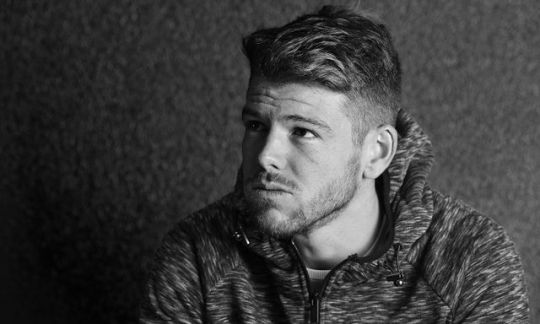
“Cómo estás?”
A simple Spanish phrase but one to which Alberto Moreno’s answer has transformed in the past three months.
Restored to the Liverpool starting line-up this term by virtue of his refusal to accept such a scenario was beyond his reach, the left-back’s redemptive story since returning to pre-season in the summer is as uplifting as the smile that forms across his face when that question – “How are you?” – comes from the visiting Kenny Dalglish at Melwood.
The positive reply to the legendary Scot in the training ground’s reception was straightforward. “Bien, bien.” Good, good.
But the story behind it is complex.
“I always believe that you should look back on the previous season before the next one starts,” Moreno tells Liverpoolfc.com in an exclusive interview.
“You always think ‘Where can I improve? How can I improve?’ You do grow and get better season on season, you think ‘How can I give more? How can I produce more?’
“A good example to look at would be this season to the one just gone, where I hardly played at all. I said to myself in the close season, ‘What can I change? What can I do differently to be able to play more?’ So, first and foremost, work really hard, try to work even harder in pre-season. I managed to have a couple of decent performances in pre-season games, so that’s a good example in comparison to how I suffered last season by being out of the side and things were tough.
“This time, it’s an example of how you can turn things around in relation to what you’ve got left to give from the previous year. I managed to turn it around; fortunately, I’m in the team and enjoying what I do this season.”
Games Played 6 Minutes Played 540 Starts 6 Interceptions 5 Substitution On 0 Substitution Off 0 Duels Won 66.1%66.1% Aerial duels won 47.1%47.1% It is fair to say that wasn’t the case throughout the last campaign.
Relegated to the substitutes’ bench as James Milner – hitherto a midfield player – was switched to left-back, the 25-year-old was restricted to just eight starts for Liverpool.
After such a significant watching brief, summer speculation suggested Moreno’s association with the club might come to an end. Jürgen Klopp then increased his options in the position with the signing of Andy Robertson.
A crossroads, perhaps.
But understand the Spaniard’s upbringing, the values planted in him by his father for example, and you understand why there was only ever one choice when he faced that fork in the road.
“When my dad first saw me playing and started to get the idea I could go all the way and make it as a professional player, he used to instil in me this ethic of working hard,” Moreno explains.
“He said ‘If you work hard, keep at it, be focused mentally and physically, look after yourself, you’ve got it within you to go all the way.’ You don’t believe it because at that age all you want to do is play the next game and have fun, you don’t look beyond that. But over the years, as you grow your ability and strength and belief, in the back of your mind you start to believe you can make it as a player yourself. But it’s very difficult and you do make lots of sacrifices. When you get to the teenage years and all your mates are going out, you want to keep fit and lead a healthy life and look after yourself because you want to be a player.
“So last season, for just one bad season I’m not going to let all that hard work and sacrifice and mental strength go and throw it to waste.”
A further source of motivation is Moreno’s young family.
The arrival of his baby daughter, in particular, provided important doses of context and clarity against the backdrop of professional football and its demands.
Indeed, she can claim a portion of credit for the comeback her father has achieved at Anfield.
“It’s not just my mental strength but huge thanks to all my family, who never at any point let me get down during that year. They helped me to be strong mentally,” he continues.
“It’s not something that you give up or go somewhere else when you’ve worked for something with such conviction for all your life. It’s about staying strong and fighting, they’re the qualities you learn as a kid, and have that determination to turn it around and change things.
“Fortunately, so far this season I can say that I’ve managed to succeed and improve on last year.
“There was one person that really helped me through it and stopped me from getting low: my little girl, who had recently been born. Getting home after training or a game and seeing her gave me all the lift I needed – to do it for her, to keep my head up and trying and fighting hard for her.”
Moreno was recruited into the Sevilla academy at the age of 10, then more of an attacking left winger than a defender.
Fast forward to his later teenage years and it was a coach at the La Liga club who called for a change in the budding youngster’s role – and he hasn’t looked back. “At that age, what more do you want in life than to be playing football regularly?”
Nor did he have to look far for role models.
As Alberto’s ambitions were developing in the south-west region of Spain, right-sider Dani Alves was stamping his mark with Sevilla en route to becoming one of the finest in the trade of his generation.
On the other flank, meanwhile, was a natural figure to look up to in Antonio Puerta.
The talented left-back had established himself for club and country when, in August 2007, tragedy struck. Puerta collapsed during the opening match of the La Liga season and died three days later as a result of the cardiac arrest he suffered at the Ramón Sánchez Pizjuán.
His death has profoundly shaped Moreno’s philosophy on life.
“It was a massive blow, a really tough and difficult time for everyone in the club. Everyone in the city felt it, not just within the football club,” he reflects.
“I happen to know his family really well and so I felt what a terrible and tough blow it was to take. When things happen like that in life, they help you to think about life and maybe rethink life in a different way. If anything, it does encourage you to live for the moment and live your life. It gives you a bit more conviction to fight for what you really believe in, what you think you know about and what you know you can achieve – and, above all, to enjoy everything while it’s happening.
“This world is such that you never know what’s going to happen next and that’s even more of an incentive to enjoy things while you are here.”
Liverpool’s call came in the summer of 2014.
Preceding that, 18 months of progress in the Sevilla first team had been capped off by Europa League glory in May of that year, Moreno featuring throughout the successful run and starting the final against Benfica, and prompted the Reds to make their move.
His connection to the Spanish club of his hometown was and remains, understandably, strong – and therefore the decision to leave came with a heavy heart.
But that emotional attachment could not overwhelm the sense of opportunity in his hands.
“It was a tough decision and a really hard decision to make, but at the same time it was a choice I knew I had to make to continue growing as a player and developing your career as a footballer,” he says.
“I viewed coming here as a big challenge for me.”
So, what were the realities of that challenge?
Moreno laughs as he recalls his opening days on Merseyside, a 22-year-old in a different country, with a new job and unable to speak the language.
“If I’m totally honest, I was a bit nervous,” admits the three-time Spanish international. “I had butterflies, I was thinking ‘How can I be here with a chance to line up alongside names like Gerrard and Coutinho?’
“That was the initial thought, a bit of trepidation. It was almost like ‘Is it real?’ But at the same time, I couldn’t wait to get started and start training and working alongside these people.
“It was like a dream you had as a kid. If you’re on the PlayStation as a kid and playing as Liverpool, you think ‘If only I could play for Liverpool one day!’ And then just a few years down the line you get here. If I take myself back to that moment, I still get the same butterflies inside thinking about it – it was a lovely feeling, a special feeling.
“As time went by and I’d been here a few days, I thought ‘I’ve had a chance to take it all in, I’m here and a club like Liverpool have paid decent money for me so it must be for a reason.’
“You believe in yourself and want to make sure you don’t let yourself or anyone else down, you’ve got to perform well and just focus on doing what you do. I’m a professional footballer and that’s what I do out there on the field.”
Out there on the field is where Moreno, happily, now finds himself with much greater frequency.
Of Liverpool’s 14 competitive matches so far in 2017-18, the defender has started 11 and shown no intention of relinquishing the shirt he worked so hard to reclaim.
“I’m doing what I’ve always wanted to do: play regularly for Liverpool. Currently I’m in the starting XI and on the teamsheet every week,” he concludes.
“Without doubt, I took the right option when faced with that crossroads, to get my head down and work hard. Now I’m doing exactly what I’ve always wanted to do.”
Bien, bien.
9 notes
·
View notes
Note
1/2 I allow you to kill me because I'm gonna do the unthinkable thing: disagree with Toby Stephens. First of all, I bow to him. No one could've played Flint as perfectly as he did. He is unreal! But there is one thing I disagree with him. :) I do not think that rage is Flint's sole motivation. It's the majority of his motivation, no doubt. But I do believe that there is more to it.
2/2 “I cannot believe we are so poorly made as that” and “Freedom in the dark” speeches are too powerful to be a delusion. They are too raw and heartbreaking. He can’t be deluding himself in those moments. He must genuinely believe in it. No way, no way he can deliver those words and not believe in them. Yes, he’s angry and I love him for it. I love that he wants revenge. But I do believe that a little bit of idealism still lives in him and it comes out in those two beautiful speeches.
!!!! i very much agree, actually, with you and with toby. essentially, flint is a character with a dual personality. he’s james mcgraw and james flint, a good man and a ‘villain’, a born cynic and inspired idealist. toby focused on one side of flint while describing him, that is he kind of oversimplified him, which i understand bc what he described is the overpowering, dominant side of flint and the side that was relevant within the context of the story he was currently talking about. flint’s hopeful, kind and forgiving side of him is more subtle, something that’s constantly overshadowed by his still very much present cynicism and distrust of both the system and most people around him. i didn’t think much of toby’s words besides that i agreed with them, but now that you brought it up i have to talk about it. strap in this might get long and boring because it’s me talking about flint ¯\_(ツ)_/¯
speaking of his idealism, what i find so fascinating about this character is his uwavering strength in protecting that fragile sense of hope considering the world he was forced to live in. once that idealism had been instilled, no matter how hellish the struggle the world had put him through was, no matter how fragile that hope had become, it never died. his idealism perservered. and it all started with thomas. this awe-inspiring man whose talks of goodness and kindness in people and need to rethink systemic things made him realize that the world and its people he saw as ‘’brutal and unforgiving’’ weren’t above change for the better. being born a good man, thomas’ overwhelming idealism that could’ve blinded every good soul on the planet took root in james and only grew from that moment on.
however, flint’s faith never reached the same depth as thomas’. where thomas believed in people in general and saw good in just about everyone, flint’s faith was in individuals. in the few good people in his life he deemed capable enough of changing the world. in people like thomas and miranda (‘’Who better qualified to oversee the building of the New World than Thomas?’‘), and later silver and madi (‘‘And you think I’m the one best suited to lead our people through this? I think that you are the best of us.The two of you together are the world in balance’‘). his trust in those people was steadfast and true. he believed their goodness could’ve changed the world for the better, but more importantly they were a promise, a reminder that somewhere out there must be more people like them, people who can fight the oppression and make a difference. (‘’I cannot believe that that is all there is. I cannot believe we are so poorly made as that.’‘) they were his true idealism, the bridge to a greater world. what breaks my heart the most, though, is that he never really considered himself to be one of them, one of the good guys, so he allowed himself the freedom to take what he believed was his and theirs with fist and sword. i actually talked about this once before. i think flint believed himself to be the tool used to push the boundaries and achieve a breakthrough within the society. someone who would incite a revolution and bring the world to its knees so the good people could recreate a new, better one. he actually admits it on a few ocassions: ‘’I don’t think that there’s a part for Captain Flint in Nassau’s future.Not with the blood on his hands.’‘, and later on when he purposely excludes himself from silver and madi’s future as the leaders of nassau.
however, putting his faith in people aside as it has been unchanging and deep ever since he first stood up for thomas and miranda, i think his idealism when it comes to the world change itself over time steered in a weird direction. i kind of see his pursuits as two different versions of an ideal world, both fought for with the people he loved and both, despite their difference, unattainable. the one he was trying to achieve with thomas, had they succeeded, would’ve been a very different world than the one he was trying to achieve with silver. to put it simply, the first one would’ve been attained with mercy and forgiveness. the change would’ve been swift and radical, but the world would’ve most likely been unsullied by blood and tragedy. this type of idealism was noble, good, the kind that thomas was preaching about and the kind that inspired james’ own idealism. but as deep-rooted as that idealism was, i think that with time it went a little askew and that ideal world he had envisioned for himself and everybody else after thomas was gone became yet another unachievable goal, only this time with a path to it paved with nothing but blood and tragedy of both the guilty and the innocent. in between his outbursts of rage and violence, flint did try to sue for peace, more than once and in the least destructive ways, and every time the world spat in his face and made him even more aware of its cruelty and resentment of the people like him. with every failed attempt to reason with the civilization he was more driven to simply destroy it all and rebuild from the ashes. with every failed attempt he was moving farther away from where he started, from thomas’ initial attempt for a peaceful and reasonable outcome and steering towards destruction. the idealism still thrived in flint, he believed in everything he said, every powerful, tear-jerking monologue was true to his soul and invoke sympathy, he still believed in those individuals to set them all free, but it all sort of merged with his anger and this obsessive need for vengeance where the ends always seemed to justify the means in his eyes, so what was once pure became something mutilated and questionable rather than inspiring.
both silver and julius were right in a sense. flint’s desire to change the world so quickly and brutally wouldn’t have resulted in a victory, not yet. the world was too strong for that, and his war was going to be a neverending nightmare for everyone involved. so, really, toby wasn’t wrong. flint is, fundementally, driven by rage and revenge against england for what it did to him and his loved ones. as you said, it’s the majority of his motivation and nearly everything he does or says kind of stems from that, even a part of his idealism. when toby said flint is playing out his own psychodrama on a massive scale, that he’s not waging war for altruistic reasons, that’s very much true and it becomes even more prominent as the seasons go and the world takes more from him. flint is not a freedom fighter. he’s not a hero. we are proven time and time again that he was ready to sacrifice almost whatever and whoever to further his war and reach the outcome he wants. had his goal not had been freedom from the oppression, he wouldn’t have been seen as the ally in the eyes of so many. he knew that what he was doing could’ve benefited everyone, that’s in part how he won the people to his side, and even though i personally believe a certain part of him truly, selflessly wanted to serve that freedom to them bc he was aware of their suffering as much as he was of his own, it still first and foremost had to have benefited him.
i also have to bring up Lauren Sarner’s review about the last episode here because she talks exactly about this and honestly i trust her judgment when it comes to black sails more than anything: Flint’s monologue, aside from being beautiful, also reveals his truest nature. Silver sees Flint as being filled with rage, and he is. But deep down, he’s also never relinquished Thomas’s idealism. Flint wanted to wage war against the world, but his belief in his ability to change it — and in Silver and Madi’s ability to see it through — was genuine. To say Flint only fought for rage is only half of the picture.
#ajdghffh i think this could've been even longer but i had to stop somewhere#anyway dont know if it makes sense lmao#and this is just my interpretation fam pls dont bite my head off#Anonymous#ask#bs meta
67 notes
·
View notes
Text
Puzzle Out: An Attempt to Unravel the Undertakings of Barangay 27
The Barangay 27 Zone 3 District 2 of Caloocan City has a population of more or less three thousand and five hundred people coming from various walks of life. In the community, the differences between the fortunate and less fortunate are slightly noticeable. The houses of the latter are mostly made up of light materials such as plywood, plastics, and cartons and are all located in a particular street. On the other hand, the more fortunate members of society have a decent household that can possibly protect them from any kind of harm. The community has already encountered a number of disasters for the past ten years, some of which greatly affected the lives of the residents.
Last November 30, 2019, I conducted an interview with Mr. Reynaldo Cunanan, the secretary of Barangay 27, to identify the hazards that the citizens are experiencing and their projects in response to those. According to him, the citizens are mainly affected by three hazards - flood, earthquake, and fire. Floodwaters are now a normal sight during typhoons and high tides. One of the primary causes of its prevalence is the reclamation of the Dagat-Dagatan area in Caloocan. Since the course of water was disrupted in the said area, there is no other way but to flow down the area of Maypajo where our Barangay is located. As claimed by him, the flood never became stagnant because of the creek that is located at the end of the vicinity where the waters are disposed of. Despite the strong typhoons that hit our country, such as the Tropical Storm Ondoy, the floods that came as a result never reached the chest-level of the residents. The earthquakes that occurred in the past didn’t greatly affect the inhabitants since the focus is nowhere near the city. This 2019, there is no recorded out-of-control fire that destroyed a large number of residences.
Aside from the three risks stated above, the officials of Barangay 27 are also facing problems that are caused by men with bad intentions. Despite having CCTV cameras around the area to monitor any kind of disturbances, crimes of stealing and at times killing still persists. Mr. Reynaldo said that as time goes on, the criminals are becoming more creative in administering their wickedness. For instance, before doing the act, they cover the CCTV cameras to prevent the officials from tracing them. The officers of the barangay tried lifting the cameras at a higher place. However, the faces of criminals become even more blurred. Another worry of the leaders is the pervasiveness of the riots between teenagers or minors. In the country, there is an act that protects minors who are in conflict with the law from being arrested. This is known as the Juvenile Justice and Welfare Act of 2006 or R.A. 9344. The barangay officials who will handle the case should be careful with their words and actions during the intervention. It is stated in the law that if the child admits the crimes that he committed, he should not be subjected to any form of quasi-judicial proceedings. In addition to that, they are also handling some of the drug cases wherein they try to convince some of the drug users and pushers that are on the list of the Philippine Drug Enforcement Agency (PDEA) to change their way. However, there are times when it doesn’t end well. As a result, the residents panic and get scared of the death that is caused by the war on drugs of the policemen. There are also issues in health-care and the environment. There is an epidemic of diseases that can be caused by the lack of trees and dirty waters around the barangay.
When disasters occur, the places that will be affected the most are the shantytown or squatters area. The materials that are used for the houses are not durable to stand heavy rains, strong fires, and earthquakes. In addition to that, they stand close to each other that it can create a domino effect when destroyed. Mr. Cunanan said that all of us will suffer when dangers occur. However, the squatters will be afflicted the most. For instance, most of them are earning a small amount of money which is not enough to sustain their daily needs. As a result, they steal electricity or they use candles which may cause a fire that can easily spread. Furthermore, during a week-long typhoon, they won’t be able to feed themselves if they do not have any money left. According to Mr. Cunanan, the safest place to go to during calamities is your house. You have access to your food supply, clothes, and other necessities. Though, you can still go to the barangay hall if your house is unavailable. The officials will provide you with relief goods and a place to stay. On the other hand, the most dangerous place is the one wherein the streets are narrow and dark.
The root cause of the mentioned issues above is poverty. Some Filipinos have low-paying jobs or no job at all to support the needs of their families - education, food, and health care. With no choice left, they resort to stealing or other forms of crimes even though it is against their personal convictions. Since their money is not enough to buy medicines that will cure their sickness, the diseases might get spread throughout the community and cause an epidemic. The lack of discipline and cooperation are the other major problems that impede the growth of the community. Mr. Cunanan said that the barangay officials have a lot of projects that intend to improve the current situation of the people. However, the residents do not see the importance of what they are doing. For example, they implemented the clearing operations or the removal of anything that is on the streets. Unfortunately, there are still a lot of cars that are parked on the sidewalk which causes traffic at times. Another is the inability of the people to throw their trash properly. Every once in a while, the barangay leads the declogging of the canals to prevent the rising of flood levels. Still, if the citizens are uncooperative, then the issues won’t be solved at all.
The community is doing things that might prevent or lessen the impact of disasters. The majority of people are practicing proper segregation to prevent any kind of disease. Caloocan City does not have its own dumpsite. This is why the government pays a lot of money to a specific location for them to be allowed to throw their trashes. A garbage truck comes every Monday, Wednesday, and Friday to collect the trashes of the residents. The barangay officials paid Php 40,000.00 for installing fire hydrants in front of the barangay hall and fire extinguishers in scattered areas. They also bought portable fire tanks to make it easier for the fire-fighters to have water access in places where the fire truck cannot enter. They also have a lot of clean and green projects such as declogging and the cleanup drive. Furthermore, there are a lot of first-aid materials in the barangay hall which will be useful in case of emergencies. During the times of disaster, the residents can stay at the evacuation center located at the back of the barangay hall. They will be provided with food and water for daily consumption. The barangay also has a number of loudspeakers that facilitate information dissemination within the area of responsibility. There are also CCTV cameras that enable the concerned individuals to monitor the whereabouts of the people.
The community is a reflection of the country. Because of the disparity in social classes, some people and societies are considered more vulnerable than the others. For instance, those people who are in the provinces may not have the proper materials to protect themselves in case of disasters such as earthquakes and typhoons. They might not have the capacity to recover from the damage that the catastrophe has caused. The budget that is allotted for community projects depends on the size of the population. Despite the desire of the officials to provide the needs of their people, they do not have the money to do so. In addition to that, because of poverty, there are a lot of squatters around the Philippines which may result in the spread of diseases, unequal distribution of resources, and inequality. Another problem is the insufficient knowledge of the Filipinos regarding the gravity of the disaster risk reduction management.
These issues stated above should be addressed by all Filipinos. The process may be hard but it is better than allowing the problem to fester. There are a lot of things that they can do in order to prevent tragedies and its large number of victims. First is by recognizing that the majority of Filipino families are poor and hungry. By determining their situation, we can understand where they are coming from and therefore provide them with financial assistance. Proper and quality education about disaster management should be provided to all Filipinos. This will encourage them to prepare for any upcoming natural disasters. The administration should implement its laws strictly. The people who disobeyed the law should be punished under due process. For example, littering is considered a crime in the Philippine constitution. However, we can still see a lot of people who are throwing their trash anywhere. The police officials should charge them based on the crime that they committed. This will help instill discipline on the Filipinos and give them a sense of responsibility. In addition to that, the government officials should also do their job properly. They should not use the money of the state for their own personal gain. As citizens of the country, we should all do our jobs to assure the future of our race.
During my community walk, I realized that there are a lot of people who are suffering from discrimination, oppression, poverty, hunger, and the lack of proper leadership from our government officials. The difference between the rich and the poor is very visible. Aside from the houses which are built from light materials, there is a lack of post lamps that provides light during the night, the surroundings are dirty, the floor is always wet, and the children are either sick or not studying. As a privileged individual who is studying at one of the most prestigious universities in the country, I became aware of the unfortunate realities in the Philippines. What we see on social media and books, the things discussed by our teachers is nowhere near the actual sufferings of these poor individuals. It made me want to immediately graduate and provide them any kind of support that may help them recover. I also realized that there are still those who haven’t received any help from the government and non-government organizations. For instance, those who are located at the top of the mountains that are very hard to access. I became grateful to those selfless volunteers who provided them with their everyday needs such as food and water. Playing our part is very important in the development of the country. For instance, planting millions of trees to save the planet is impossible if you’re going to do it alone. But, if we all work together we will reach our goal.
Our age and status as students should not limit us from providing concrete solutions to address the mentioned vulnerabilities above. By actively participating in the projects provided by both the barangay and National Service Training Program, we are already contributing to the betterment of our society. The university has an organization that teaches and facilitates first-aid training that may be useful in times of need. We can ask the local government units if there is a possibility for them to provide safety kits since the community is facing a lot of natural disasters. Strictly following the laws of the government can also reduce problems that they are experiencing. To emphasize what was stated before, we need to practice proper waste segregation and disposal as it may prevent the spread of diseases and high floods. To increase the capacities of our community, we can participate in the seminars provided by the government and schools as it will increase our knowledge and awareness regarding certain issues. Sending donations are also a way to help our less fortunate brothers and sisters. If we have the time, we can teach basic things to the children in our community such as the alphabet, numbers, colors, and how to read books.
0 notes